

28 Best Academic Search Engines That make your research easier
This post may contain affiliate links that allow us to earn a commission at no expense to you. Learn more

If you’re a researcher or scholar, you know that conducting effective online research is a critical part of your job. And if you’re like most people, you’re always on the lookout for new and better ways to do it.
I’m sure you are familiar with some research databases. But, top researchers keep an open mind and are always looking for inspiration in unexpected places.
This article aims to give you an edge over researchers that rely mainly on Google for their entire research process.
Our list of 28 academic search engines will start with the more familiar to less.
Table of Contents
#1. Google Scholar

Google Scholar is an academic search engine that indexes the full text or metadata of scholarly literature across an array of publishing formats and disciplines.
Great for academic research, you can use Google Scholar to find articles from academic journals, conference proceedings, theses, and dissertations. The results returned by Google Scholar are typically more relevant and reliable than those from regular search engines like Google.
Tip: You can restrict your results to peer-reviewed articles only by clicking on the “Scholarly”
- Scholarly results are typically more relevant and reliable than those from regular search engines like Google.
- You can restrict your results to peer-reviewed articles only by clicking on the “Scholarly” tab.
- Google Scholar database Coverage is extensive, with approx. 200 million articles indexed.
- Abstracts are available for most articles.
- Related articles are shown, as well as the number of times an article has been cited.
- Links to full text are available for many articles.
- Abstracts are only a snippet of the full article, so you might need to do additional searching to get the full information you need.
- Not all articles are available in full text.
Google Scholar is completely free.
#2. ERIC (Education Resources Information Center)
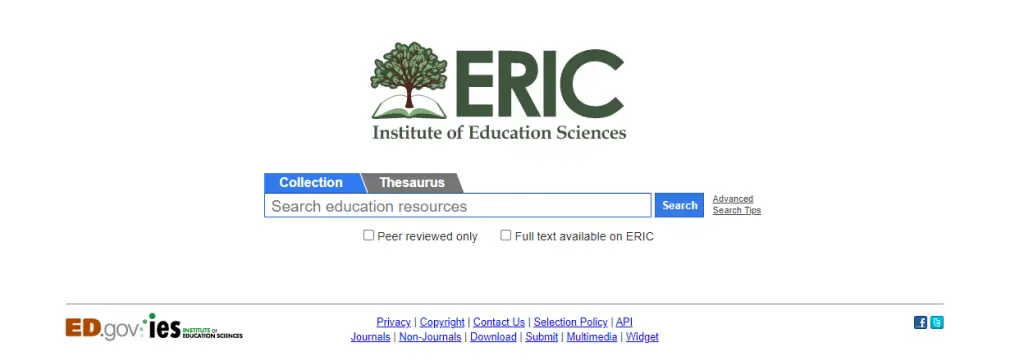
ERIC (short for educational resources information center) is a great academic search engine that focuses on education-related literature. It is sponsored by the U.S. Department of Education and produced by the Institute of Education Sciences.
ERIC indexes over a million articles, reports, conference papers, and other resources on all aspects of education from early childhood to higher education. So, search results are more relevant to Education on ERIC.
- Extensive coverage: ERIC indexes over a million articles, reports, and other resources on all aspects of education from early childhood to higher education.
- You can limit your results to peer-reviewed journals by clicking on the “Peer-Reviewed” tab.
- Great search engine for educators, as abstracts are available for most articles.
ERIC is a free online database of education-related literature.
You might also like:
- Best Plagiarism Checkers For Research Papers
- 30+ Essential Software For Researchers
- Best AI-Based Summary Generators
- 25 Best Schools For International Relations In The US
- GPTZero Review
#3. Wolfram Alpha

Wolfram Alpha is a “computational knowledge engine” that can answer factual questions posed in natural language. It can be a useful search tool.
Type in a question like “What is the square root of 64?” or “What is the boiling point of water?” and Wolfram Alpha will give you an answer.
Wolfram Alpha can also be used to find academic articles. Just type in your keywords and Wolfram Alpha will generate a list of academic articles that match your query.
Tip: You can restrict your results to peer-reviewed journals by clicking on the “Scholarly” tab.
- Can answer factual questions posed in natural language.
- Can be used to find academic articles.
- Results are ranked by relevance.
- Results can be overwhelming, so it’s important to narrow down your search criteria as much as possible.
- The experience feels a bit more structured but it could also be a bit restrictive
Wolfram Alpha offers a few pricing options, including a “Pro” subscription that gives you access to additional features, such as the ability to create custom reports. You can also purchase individual articles or download them for offline use.
Pro costs $5.49 and Pro Premium costs $9.99
#4. iSEEK Education
- 15 Best Websites To Download Research Papers For Free
- 15 Best Academic Research Trend Prediction Platforms
- Academic Tools
- 15 Best Academic Networking And Collaboration Platforms
iSEEK is a search engine targeting students, teachers, administrators, and caregiver. It’s designed to be safe with editor-reviewed content.
iSEEK Education also includes a “Cited by” feature which shows you how often an article has been cited by other researchers.
- Editor-reviewed content.
- “Cited by” feature shows how often an article has been cited by other researchers.
- Limited to academic content.
- Doesn’t have the breadth of coverage that some of the other academic search engines have.
iSEEK Education is free to use.
#5. BASE (Bielefeld Academic Search Engine)
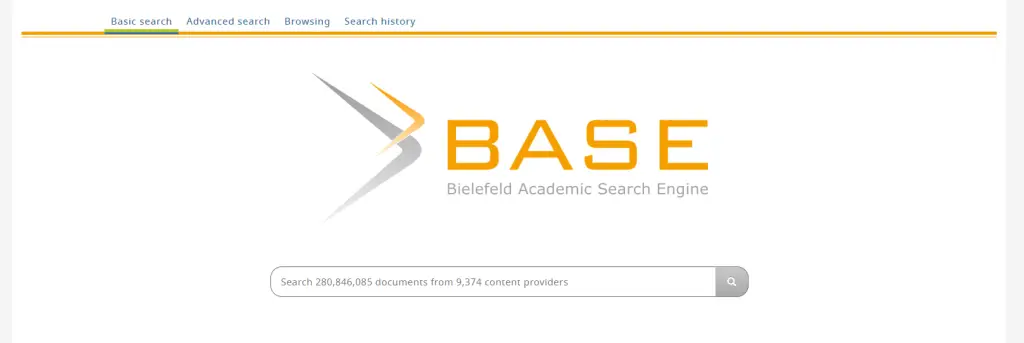
BASE is hosted at Bielefeld University in Germany and that’s where it name stems from (Bielefeld Academic Search Engine).
Known as “one of the most comprehensive academic web search engines,” it contains over 100 million documents from 4,000 different sources.
Users can narrow their search using the advanced search option, so regardless of whether you need a book, a review, a lecture, a video or a thesis, BASE has what you need.
BASE indexes academic articles from a variety of disciplines, including the arts, humanities, social sciences, and natural sciences.
- One of the world’s most voluminous search engines,
- Indexes academic articles from a variety of disciplines, especially for academic web resources
- Includes an “Advanced Search” feature that lets you restrict your results to peer-reviewed journals.
- Doesn’t include abstracts for most articles.
- Doesn’t have related articles, references, cited by
BASE is free to use.
- 10 Best Reference Management Software for Research 2023
- 15 Best Academic Networking and Collaboration Platforms
- 30+ Essential Software for Researchers
- 15 Best Academic Blogging and Content Management
- 11 Best Academic Writing Tools For Researchers
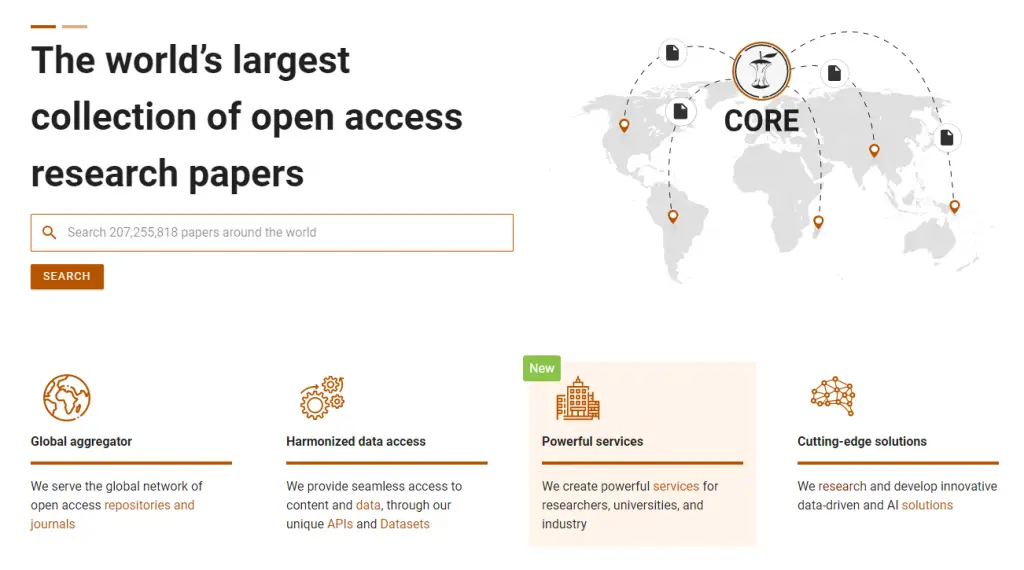
CORE is an academic search engine that focuses on open access research papers. A link to the full text PDF or complete text web page is supplied for each search result. It’s academic search engine dedicated to open access research papers.
- Focused on open access research papers.
- Links to full text PDF or complete text web page are supplied for each search result.
- Export formats include BibTeX, Endnote, RefWorks, Zotero.
- Coverage is limited to open access research papers.
- No abstracts are available for most articles.
- No related articles, references, or cited by features.
CORE is free to use.
- Best Plagiarism Checkers for Research Papers in 2024
#7. Science.gov

Science.gov is a search engine developed and managed by the United States government. It includes results from a variety of scientific databases, including NASA, EPA, USGS, and NIST.
US students are more likely to have early exposure to this tool for scholarly research.
- Coverage from a variety of scientific databases (200 million articles and reports).
- Links to full text are available for some articles.
Science.gov is free to use.
- 15 Best Academic Journal Discovery Platforms
- Sci Hub Review
#8. Semantic Scholar

Semantic Scholar is a recent entrant to the field. Its goal is to provide more relevant and effective search results via artificial intelligence-powered methods that detect hidden relationships and connections between research topics.
- Powered by artificial intelligence, which enhances search results.
- Covers a large number of academic articles (approx. 40 million).
- Related articles, references, and cited by features are all included.
- Links to full text are available for most articles.
Semantic Scholar is free to use.
- 11 Best Academic Writing Tools For Researchers
- 10 Best Reference Management Software for Research
- 15 Best Academic Journal Discovery Platforms
#9. RefSeek

RefSeek searches more than five billion documents, including web pages, books, encyclopedias, journals, and newspapers.
This is one of the free search engines that feels like Yahoo with a massive directory. It could be good when you are just looking for research ideas from unexpected angles. It could lead you to some other database that you might not know such as the CIA The World Factbook, which is a great reference tool.
- Searches more than five billion documents.
- The Documents tab is very focused on research papers and easy to use.
- Results can be filtered by date, type of document, and language.
- Good source for free academic articles, open access journals, and technical reports.
- The navigation and user experience is very dated even to millenials…
- It requires more than 3 clicks to dig up interesting references (which is how it could lead to you something beyond the 1st page of Google)
- The top part of the results are ALL ads (well… it’s free to use)
RefSeek is free to use.
#10. ResearchGate

A mixture of social networking site + forum + content databases where researchers can build their profile, share research papers, and interact with one another.
Although it is not an academic search engine that goes outside of its site, ResearchGate ‘s library of works offers an excellent choice for any curious scholar.
There are more than 100 million publications available on the site from over 11 million researchers. It is possible to search by publication, data, and author, as well as to ask the researchers questions.
- A great place to find research papers and researchers.
- Can follow other researchers and get updates when they share new papers or make changes to their profile.
- The network effect can be helpful in finding people who have expertise in a particular topic.
- Interface is not as user friendly
- Can be overwhelming when trying to find relevant papers.
- Some papers are behind a paywall.
ResearchGate is free to use.
- 15 Best Academic Research Trend Prediction Platforms
- 25 Best Tools for Tracking Research Impact and Citations
#11. DataONE Search (formerly CiteULike)
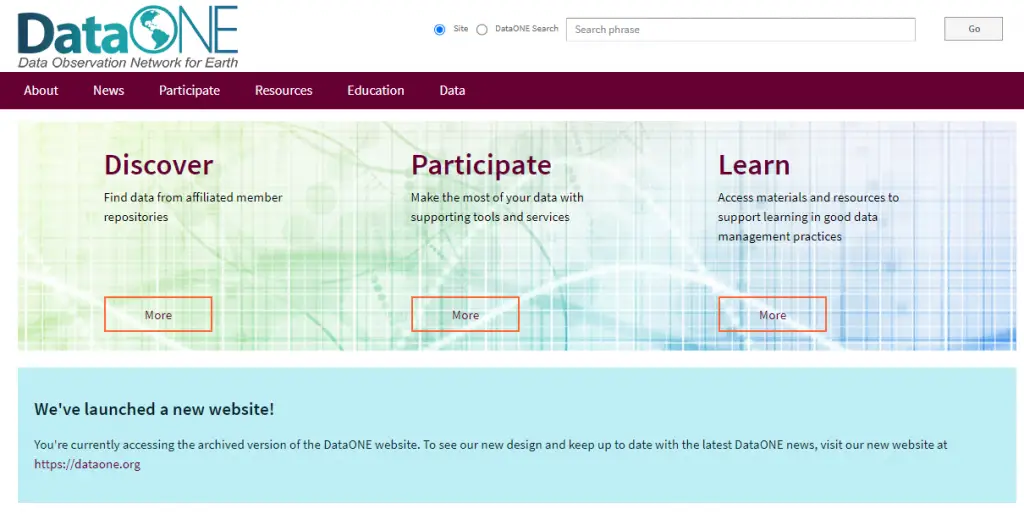
A social networking site for academics who want to share and discover academic articles and papers.
- A great place to find academic papers that have been shared by other academics.
- Some papers are behind a paywall
CiteULike is free to use.
#12. DataElixir

DataElixir is deigned to help you find, understand and use data. It includes a curated list of the best open datasets, tools and resources for data science.
- Dedicated resource for finding open data sets, tools, and resources for data science.
- The website is easy to navigate.
- The content is updated regularly
- The resources are grouped by category.
- Not all of the resources are applicable to academic research.
- Some of the content is outdated.
DataElixir is free to use.
#13. LazyScholar – browser extension
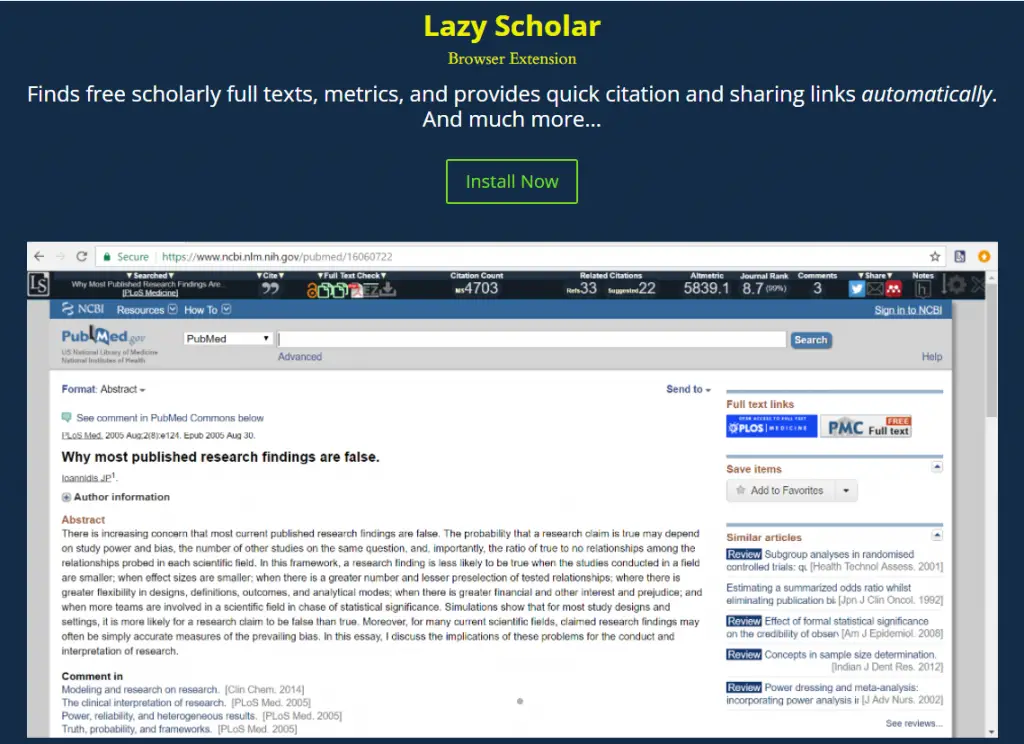
LazyScholar is a free browser plugin that helps you discover free academic full texts, metrics, and instant citation and sharing links. Lazy Scholar is created Colby Vorland, a postdoctoral fellow at Indiana University.
- It can integrate with your library to find full texts even when you’re off-campus.
- Saves your history and provides an interface to find it.
- A pre-formed citation is availlable in over 900 citation styles.
- Can recommend you topics and scans new PubMed listings to suggest new papers
- Results can be a bit hit or miss
LazyScholar is free to use.
#14. CiteseerX – digital library from PenState

CiteseerX is a digital library stores and indexes research articles in Computer Science and related fields. The site has a robust search engine that allows you to filter results by date, author.
- Searches a large number of academic papers.
- Results can be filtered by date, author, and topic.
- The website is easy to use.
- You can create an account and save your searches for future reference.
CiteseerX is free to use.
- Surfer Review: Is It Worth It?
- 25 Best Tools For Tracking Research Impact And Citations
#15. The Lens – patents search
The Lens or the Patent Lens is an online patent and scholarly literature search facility, provided by Cambia, an Australia-based non-profit organization.

- Searches for a large number of academic papers.
The price range can be free for non-profit use to $5,000 for commercial enterprise.
#16. Fatcat – wiki for bibliographic catalog
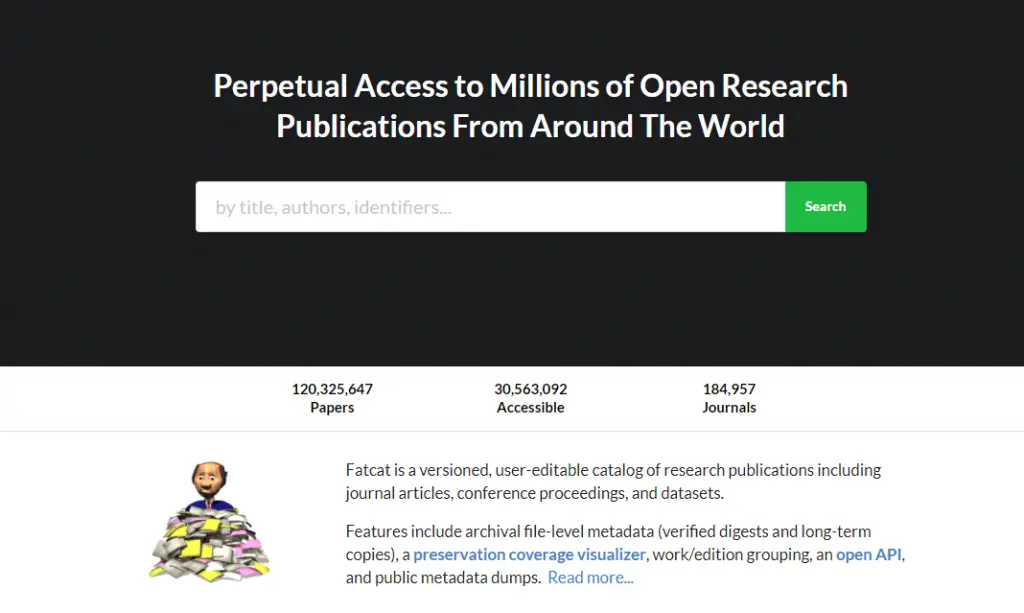
Fatcat is an open bibliographic catalog of written works. The scope of works is somewhat flexible, with a focus on published research outputs like journal articles, pre-prints, and conference proceedings. Records are collaboratively editable, versioned, available in bulk form, and include URL-agnostic file-level metadata.
- Open source and collaborative
- You can be part of the community that is very focused on its mission
- The archival file-level metadata (verified digests and long-term copies) is a great feature.
- Could prove to be another rabbit hole
- People either love or hate the text-only interface
#17. Lexis Web – Legal database
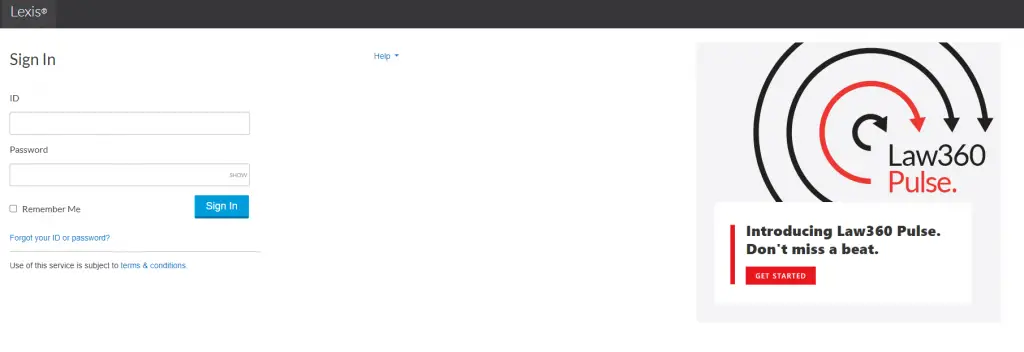
Are you researching legal topics? You can turn to Lexis Web for any law-related questions you may have. The results are drawn from legal sites and can be filtered based on criteria such as news, blogs, government, and commercial. Additionally, users can filter results by jurisdiction, practice area, source and file format.
- Results are drawn from legal sites.
- Filters are available based on criteria such as news, blogs, government, and commercial.
- Users can filter results by jurisdiction, practice area, source and file format.
- Not all law-related questions will be answered by this search engine.
- Coverage is limited to legal sites only.
Lexis Web is free for up to three searches per day. After that, a subscription is required.
#18. Infotopia – part of the VLRC family
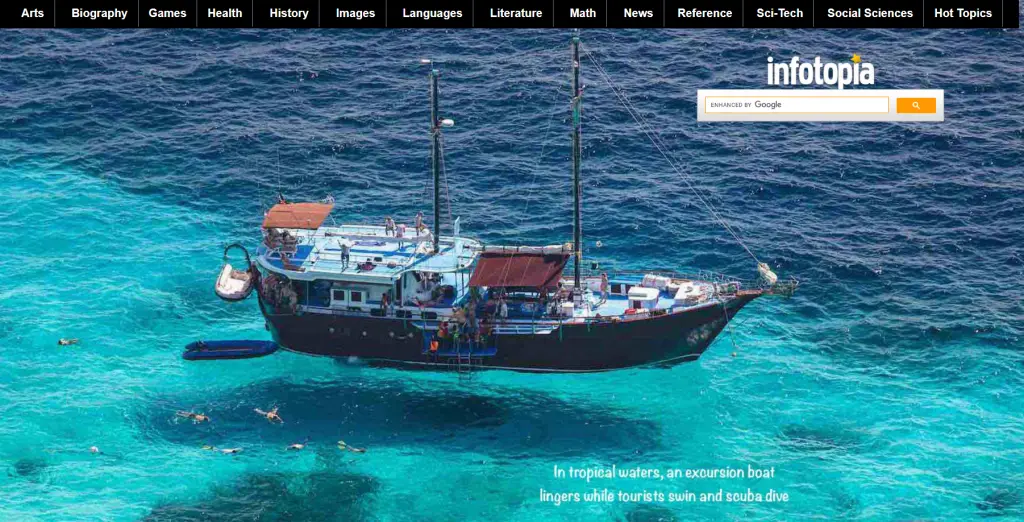
Infotopia touts itself as an “alternative to Google safe search.” Scholarly book results are curated by librarians, teachers, and other educational workers. Users can select from a range of topics such as art, health, and science and technology, and then see a list of resources pertaining to the topic.
Consequently, if you aren’t able to find what you are looking for within Infotopia’s pages, you will probably find it on one of its many suggested websites.
#19. Virtual Learning Resources Center
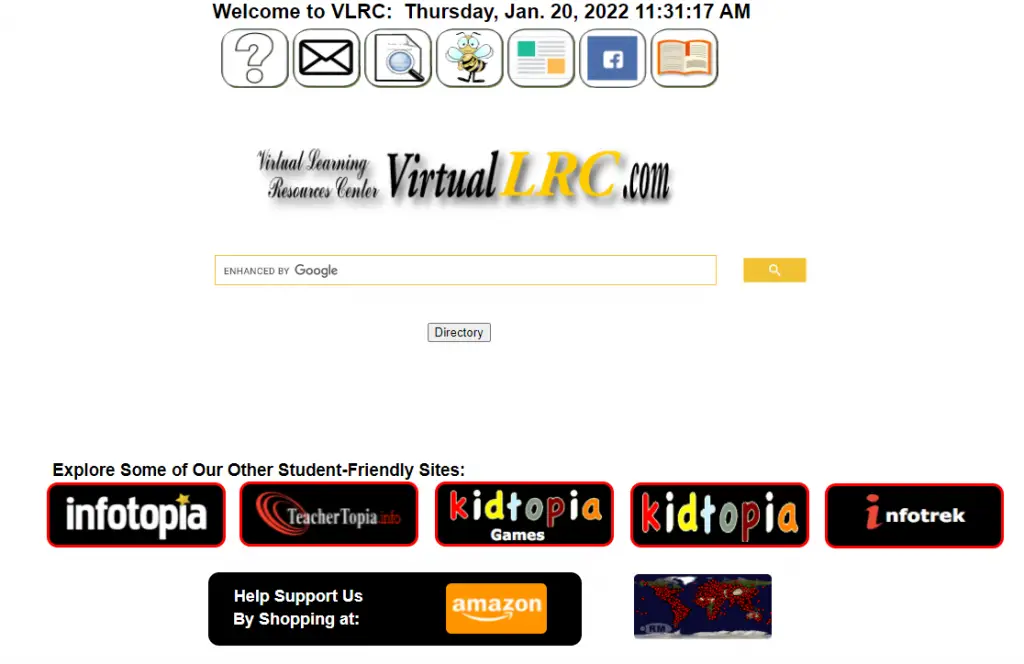
Virtual Learning Resources Center (VLRC) is an academic search engine that features thousands of academic sites chosen by educators and librarians worldwide. Using an index generated from a research portal, university, and library internet subject guides, students and instructors can find current, authoritative information for school.
- Thousands of academic information websites indexed by it. You will also be able to get more refined results with custom Google search, which will speed up your research.
- Many people consider VLRC as one of the best free search engines to start looking for research material.
- TeachThought rated the Virtual LRC #3 in it’s list of 100 Search Engines For Academic Research
- More relevant to education
- More relevant to students

Powered by Google Custom Search Engine (CSE), Jurn is a free online search engine for accessing and downloading free full-text scholarly papers. It was created by David Haden in a public open beta version in February 2009, initially for locating open access electronic journal articles in the arts and humanities.
After the indexing process was completed, a website containing additional public directories of web links to indexed publications was introduced in mid-2009. The Jurn search service and directory has been regularly modified and cleaned since then.
- A great resource for finding academic papers that are behind paywalls.
- The content is updated regularly.uren
Jurn is free to use.
#21. WorldWideScience
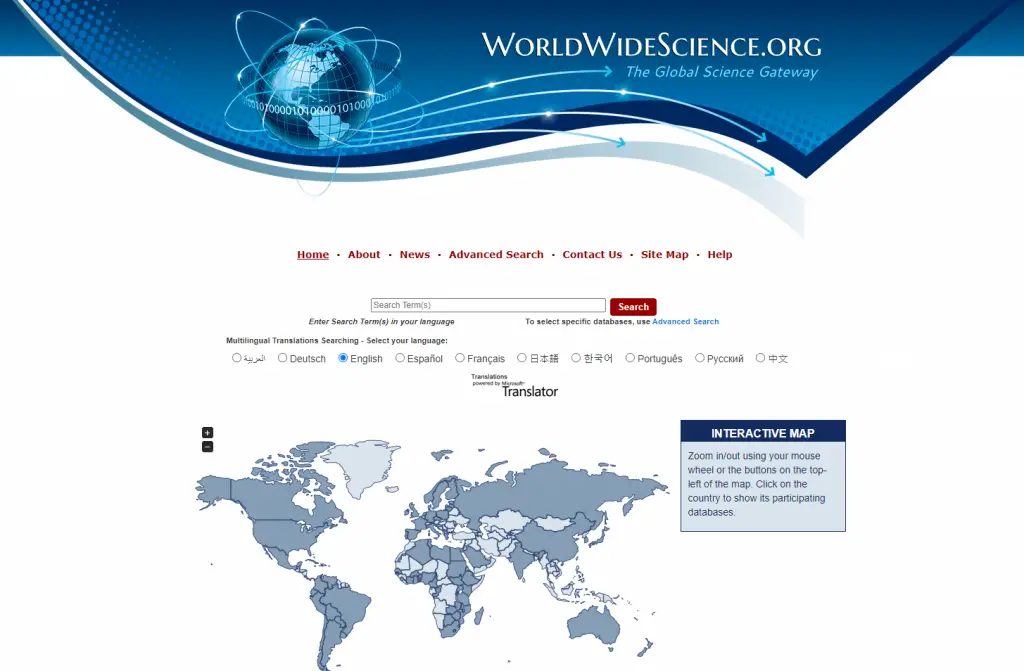
The Office of Scientific and Technical Information—a branch of the Office of Science within the U.S. Department of Energy—hosts the portal WorldWideScience , which has dubbed itself “The Global Science Gateway.”
Over 70 countries’ databases are used on the website. When a user enters a query, it contacts databases from all across the world and shows results in both English and translated journals and academic resources.
- Results can be filtered by language and type of resource
- Interface is easy to use
- Contains both academic journal articles and translated academic resources
- The website can be difficult to navigate.
WorldWideScience is free to use.
#22. Google Books
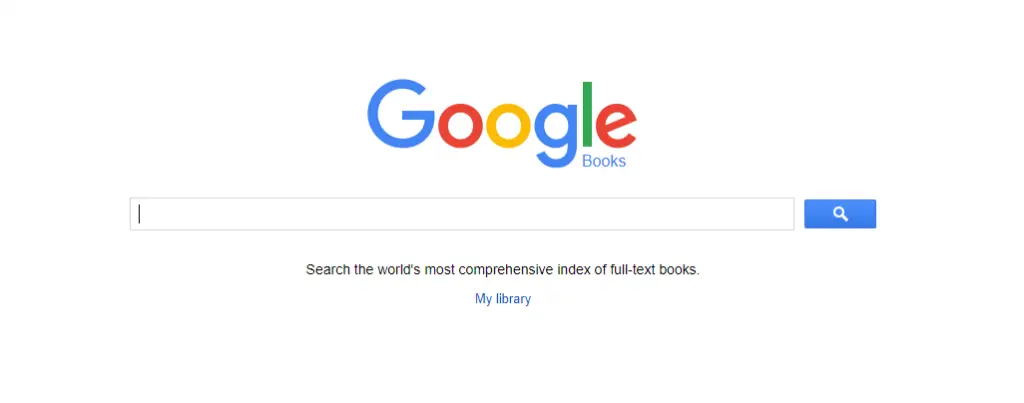
A user can browse thousands of books on Google Books, from popular titles to old titles, to find pages that include their search terms. You can look through pages, read online reviews, and find out where to buy a hard copy once you find the book you are interested in.
#23. DOAJ (Directory of Open Access Journals)
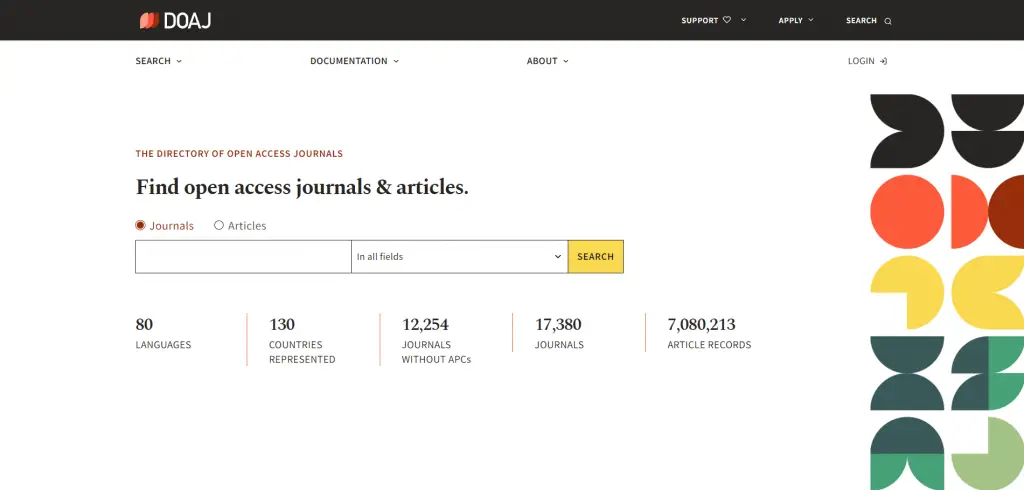
DOAJ is a free search engine for scientific and scholarly materials. It is a searchable database with over 8,000 peer-reviewed research papers organized by subject. It’s one of the most comprehensive libraries of scientific and scholarly resources, with over 8,000 journals available on a variety of themes.
#24. Baidu Scholar

Baidu Xueshu (Academic) is the Chinese version for Google Scholar. IDU Scholar indexes academic papers from a variety of disciplines in both Chinese and English.
- Articles are available in full text PDF.
- Covers a variety of academic disciplines.
- No abstracts are available for most articles, but summaries are provided for some.
- A great portal that takes you to different specialized research platform
- You need to be able to read Chinese to use the site
- Since 2021 there is a rise of focus on China and the Chinese Communist Party
Baidu Scholar is free to use.
#25. PubMed Central
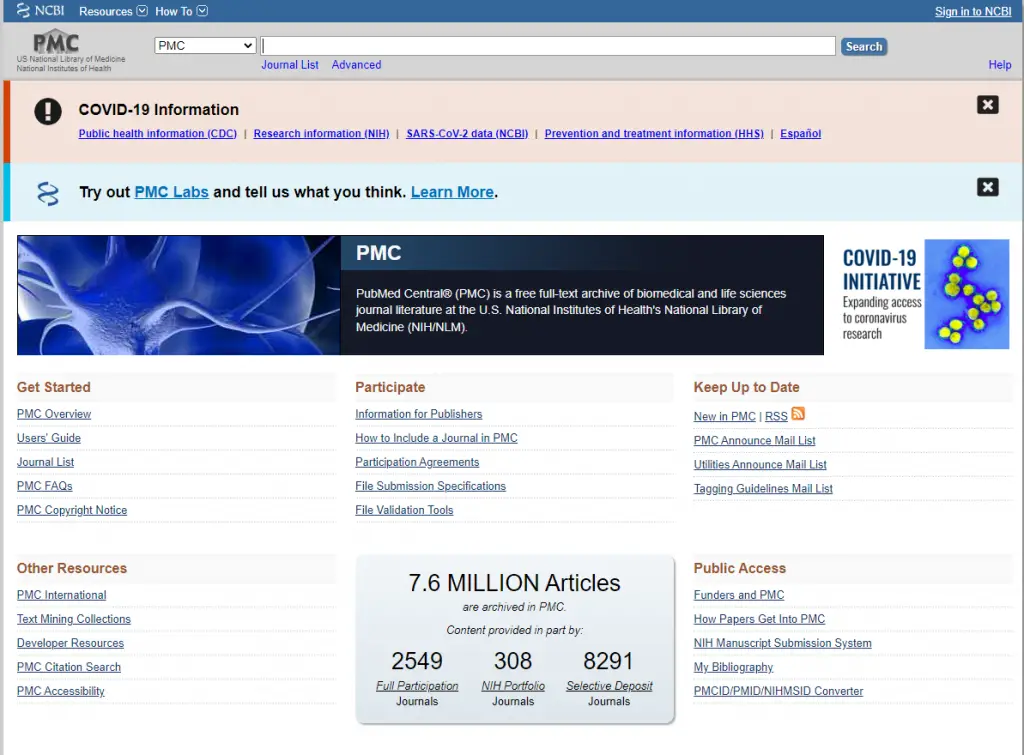
PubMed is a free search engine that provides references and abstracts for medical, life sciences, and biomedical topics.
If you’re studying anything related to healthcare or science, this site is perfect. PublicMed Central is operated by the National Center for Biotechnology Information, a division of the U.S. National Library of Medicine. It contains more than 3 million full-text journal articles.
It’s similar to PubMed Health, which focuses on health-related research and includes abstracts and citations to over 26 million articles.
#26. MEDLINE®
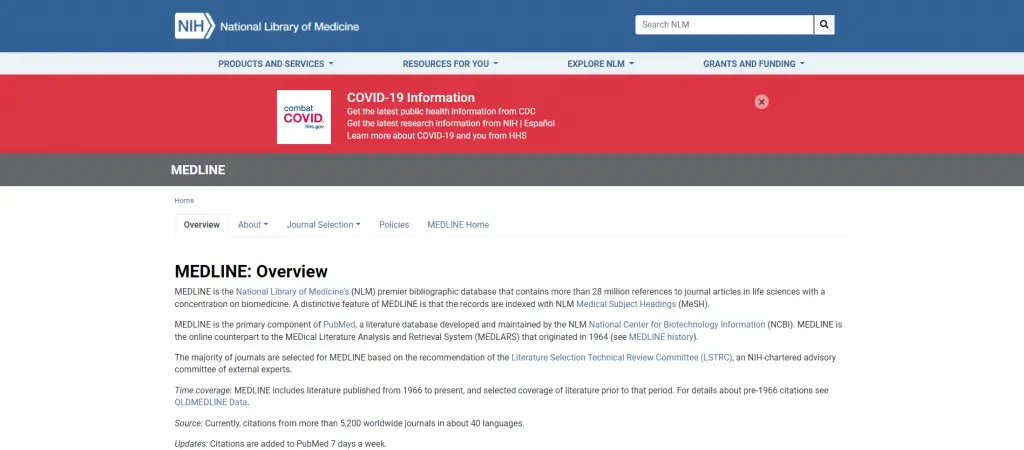
MEDLINE® is a paid subscription database for life sciences and biomedicine that includes more than 28 million citations to journal articles. For finding reliable, carefully chosen health information, Medline Plus provides a powerful search tool and even a dictionary.
- A great database for life sciences and biomedicine.
- Contains more than 28 million references to journal articles.
- References can be filtered by date, type of document, and language.
- The database is expensive to access.
- Some people find it difficult to navigate and find what they are looking for.
MEDLINE is not free to use ( pricing information ).
Defunct Academic Search Engines
#27. microsoft academic .
Microsoft Academic
Microsoft Academic Search seemed to be a failure from the beginning. It ended in 2012, then re-launched in 2016 as Microsoft Academic. It provides the researcher with the opportunity to search academic publications,
Microsoft Academic used to be the second-largest academic search engine after Google Scholar. Microsoft Academic provides a wealth of data for free, but Microsoft has announced that it will shut Microsoft Academic down in by 2022.
#28. Scizzle
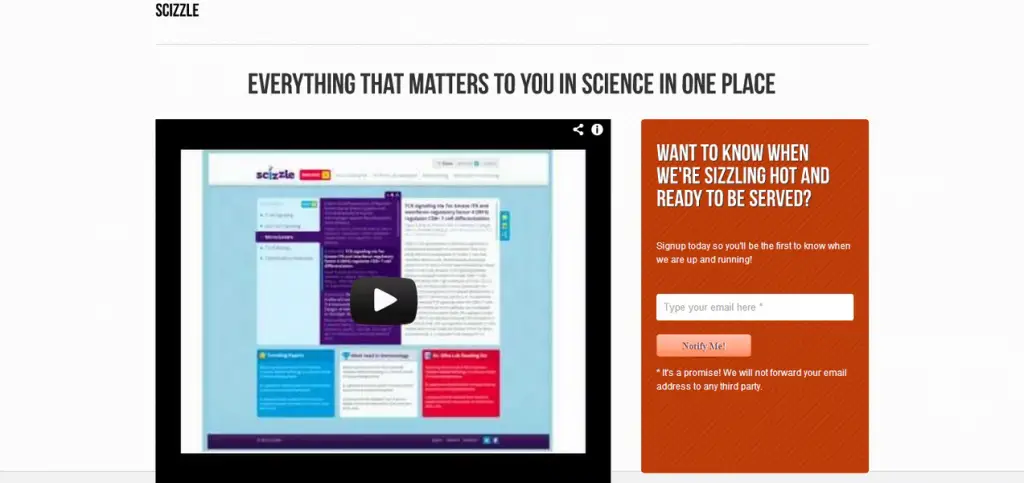
Designed to help researchers stay on top of the literature by setting up email alerts, based on key terms, for newspapers.
Unfortunately, academic search engines come and go. These are two that are no longer available.
Final Thoughts
There are many academic search engines that can help researchers and scholars find the information they need. This list provides a variety of options, starting with more familiar engines and moving on to less well-known ones.
Keeping an open mind and exploring different sources is essential for conducting effective online research. With so much information at our fingertips, it’s important to make sure we’re using the best tools available to us.
Tell us in the comment below which academic search engine have you not heard of? Which database do you think we should add? What database do your professional societies use? What are the most useful academic websites for research in your opinion?
There is more.
Check out our other articles on the Best Academic Tools Series for Research below.
- Learn how to get more done with these Academic Writing Tools
- Learn how to proofread your work with these Proofreading Tools
- Learn how to broaden your research landscape with these Academic Search Engines
- Learn how to manage multiple research projects with these Project Management Tools
- Learn how to run effective survey research with these Survey Tools for Research
- Learn how get more insights from important conversations and interviews with Transcription Tools
- Learn how to manage the ever-growing list of references with these Reference Management Software
- Learn how to double your productivity with literature reviews with these AI-Based Summary Generators
- Learn how to build and develop your audience with these Academic Social Network Sites
- Learn how to make sure your content is original and trustworthy with these Plagiarism Checkers
- Learn how to talk about your work effectively with these Science Communication Tools
10 thoughts on “28 Best Academic Search Engines That make your research easier”
Thank you so much Joannah..I have found this information useful to me as librarian in an academic library
You are welcome! We are happy to hear that!
Thank You Team, for providing a comprehensive list of academic search engines that can help make research easier for students and scholars. The variety of search engines included offers a range of options for finding scholarly articles, journals, and other academic resources. The article also provides a brief summary of each search engine’s features, which helps in determining which one is the best fit for a specific research topic. Overall, this article is a valuable resource for anyone looking for a quick and easy way to access a wealth of academic information.
Thank you for taking the time to share your feedback with us. We are delighted to hear that you found our list of academic search engines helpful in making research easier for students and scholars. We understand the importance of having a variety of options when it comes to finding scholarly articles, journals, and other academic resources, and we strive to provide a comprehensive list of resources to meet those needs.
We are glad that you found the brief summary of each search engine’s features helpful in determining which one is the best fit for a specific research topic. Our goal is to make it easy for our readers to access valuable academic information and we’re glad that we were able to achieve that for you.
We appreciate your support and thank you for your kind words. We will continue to provide valuable resources for students and researchers in the future. Please let us know if you have any further questions or suggestions.
No more questions Thank You
I cannot thank you enough!!! thanks alot 🙂
Typography animation is a technique that combines text and motion to create visually engaging and dynamic animations. It involves animating individual letters, words, or phrases in various ways to convey a message, evoke emotions, or enhance the visual impact of a design or video. – Typography Animation Techniques Tools and Online Software {43}
Hi Joannah! Here’s another one you may want to add! Expontum ( https://www.expontum.com/ ) – Helps researchers quickly find knowledge gaps and identify what research projects have been completed before. Thanks!
Expontum – Helps researchers quickly find knowledge gaps and identify what research projects have been completed before. Expontum is free, open access, and available to all globally with no paid versions of the site. Automated processes scan research article information 24/7 so this website is constantly updating. By looking at over 35 million research publications (240 million by the end of 2023), the site has 146 million tagged research subjects and 122 million tagged research attributes. Learn more about methodology and sources on the Expontum About Page ( https://www.expontum.com/about.php )
Hey Ryan, I clicked and checked your site and thought it was very relevant to our reader. Thank you for sharing. And, we will be reviewing your site soon.
Sounds good! Thanks, Joannah!
Leave a Comment Cancel reply
Save my name, email, and website in this browser for the next time I comment.
We maintain and update science journals and scientific metrics. Scientific metrics data are aggregated from publicly available sources. Please note that we do NOT publish research papers on this platform. We do NOT accept any manuscript.
2012-2024 © scijournal.org
21 Legit Research Databases for Free Journal Articles in 2022
#scribendiinc
Written by Scribendi
Has this ever happened to you? While looking for websites for research, you come across a research paper site that claims to connect academics to a peer-reviewed article database for free.
Intrigued, you search for keywords related to your topic, only to discover that you must pay a hefty subscription fee to access the service. After the umpteenth time being duped, you begin to wonder if there's even such a thing as free journal articles .
Subscription fees and paywalls are often the bane of students and academics, especially those at small institutions who don't provide access to many free article directories and repositories.
Whether you're working on an undergraduate paper, a PhD dissertation, or a medical research study, we want to help you find tools to locate and access the information you need to produce well-researched, compelling, and innovative work.
Below, we discuss why peer-reviewed articles are superior and list out the best free article databases to use in 2022.
Download Our Free Research Database Roundup PDF
Why peer-reviewed scholarly journal articles are more authoritative.

Determining what sources are reliable can be challenging. Peer-reviewed scholarly journal articles are the gold standard in academic research. Reputable academic journals have a rigorous peer-review process.
The peer review process provides accountability to the academic community, as well as to the content of the article. The peer review process involves qualified experts in a specific (often very specific) field performing a review of an article's methods and findings to determine things like quality and credibility.
Peer-reviewed articles can be found in peer-reviewed article databases and research databases, and if you know that a database of journals is reliable, that can offer reassurances about the reliability of a free article. Peer review is often double blind, meaning that the author removes all identifying information and, likewise, does not know the identity of the reviewers. This helps reviewers maintain objectivity and impartiality so as to judge an article based on its merit.
Where to Find Peer-Reviewed Articles
Peer-reviewed articles can be found in a variety of research databases. Below is a list of some of the major databases you can use to find peer-reviewed articles and other sources in disciplines spanning the humanities, sciences, and social sciences.
What Are Open Access Journals?
An open access (OA) journal is a journal whose content can be accessed without payment. This provides scholars, students, and researchers with free journal articles . OA journals use alternate methods of funding to cover publication costs so that articles can be published without having to pass those publication costs on to the reader.

Some of these funding models include standard funding methods like advertising, public funding, and author payment models, where the author pays a fee in order to publish in the journal. There are OA journals that have non-peer-reviewed academic content, as well as journals that focus on dissertations, theses, and papers from conferences, but the main focus of OA is peer-reviewed scholarly journal articles.
The internet has certainly made it easier to access research articles and other scholarly publications without needing access to a university library, and OA takes another step in that direction by removing financial barriers to academic content.
Choosing Wisely
Features of legitimate oa journals.
There are things to look out for when trying to decide if a free publication journal is legitimate:
Mission statement —The mission statement for an OA journal should be available on their website.
Publication history —Is the journal well established? How long has it been available?
Editorial board —Who are the members of the editorial board, and what are their credentials?
Indexing —Can the journal be found in a reliable database?
Peer review —What is the peer review process? Does the journal allow enough time in the process for a reliable assessment of quality?
Impact factor —What is the average number of times the journal is cited over a two-year period?
Features of Illegitimate OA Journals
There are predatory publications that take advantage of the OA format, and they are something to be wary of. Here are some things to look out for:
Contact information —Is contact information provided? Can it be verified?
Turnaround —If the journal makes dubious claims about the amount of time from submission to publication, it is likely unreliable.
Editorial board —Much like determining legitimacy, looking at the editorial board and their credentials can help determine illegitimacy.
Indexing —Can the journal be found in any scholarly databases?
Peer review —Is there a statement about the peer review process? Does it fit what you know about peer review?
How to Find Scholarly Articles
Identify keywords.
Keywords are included in an article by the author. Keywords are an excellent way to find content relevant to your research topic or area of interest. In academic searches, much like you would on a search engine, you can use keywords to navigate through what is available to find exactly what you're looking for.
Authors provide keywords that will help you easily find their article when researching a related topic, often including general terms to accommodate broader searches, as well as some more specific terms for those with a narrower scope. Keywords can be used individually or in combination to refine your scholarly article search.
Narrow Down Results
Sometimes, search results can be overwhelming, and searching for free articles on a journal database is no exception, but there are multiple ways to narrow down your results. A good place to start is discipline.
What category does your topic fall into (psychology, architecture, machine learning, etc.)? You can also narrow down your search with a year range if you're looking for articles that are more recent.
A Boolean search can be incredibly helpful. This entails including terms like AND between two keywords in your search if you need both keywords to be in your results (or, if you are looking to exclude certain keywords, to exclude these words from the results).
Consider Different Avenues
If you're not having luck using keywords in your search for free articles, you may still be able to find what you're looking for by changing your tactics. Casting a wider net sometimes yields positive results, so it may be helpful to try searching by subject if keywords aren't getting you anywhere.
You can search for a specific publisher to see if they have OA publications in the academic journal database. And, if you know more precisely what you're looking for, you can search for the title of the article or the author's name.
The Top 21 Free Online Journal and Research Databases
Navigating OA journals, research article databases, and academic websites trying to find high-quality sources for your research can really make your head spin. What constitutes a reliable database? What is a useful resource for your discipline and research topic? How can you find and access full-text, peer-reviewed articles?
Fortunately, we're here to help. Having covered some of the ins and outs of peer review, OA journals, and how to search for articles, we have compiled a list of the top 21 free online journals and the best research databases. This list of databases is a great resource to help you navigate the wide world of academic research.
These databases provide a variety of free sources, from abstracts and citations to full-text, peer-reviewed OA journals. With databases covering specific areas of research and interdisciplinary databases that provide a variety of material, these are some of our favorite free databases, and they're totally legit!
CORE is a multidisciplinary aggregator of OA research. CORE has the largest collection of OA articles available. It allows users to search more than 219 million OA articles. While most of these link to the full-text article on the original publisher's site, or to a PDF available for download, five million records are hosted directly on CORE.
CORE's mission statement is a simple and straightforward commitment to offering OA articles to anyone, anywhere in the world. They also host communities that are available for researchers to join and an ambassador community to enhance their services globally. In addition to a straightforward keyword search, CORE offers advanced search options to filter results by publication type, year, language, journal, repository, and author.
CORE's user interface is easy to use and navigate. Search results can be sorted based on relevance or recency, and you can search for relevant content directly from the results screen.
Collection: 219,537,133 OA articles
Other Services: Additional services are available from CORE, with extras that are geared toward researchers, repositories, and businesses. There are tools for accessing raw data, including an API that provides direct access to data, datasets that are available for download, and FastSync for syncing data content from the CORE database.
CORE has a recommender plug-in that suggests relevant OA content in the database while conducting a search and a discovery feature that helps you discover OA versions of paywalled articles. Other features include tools for managing content, such as a dashboard for managing repository output and the Repository Edition service to enhance discoverability.
Good Source of Peer-Reviewed Articles: Yes
Advanced Search Options: Language, author, journal, publisher, repository, DOI, year
2. ScienceOpen
Functioning as a research and publishing network, ScienceOpen offers OA to more than 74 million articles in all areas of science. Although you do need to register to view the full text of articles, registration is free. The advanced search function is highly detailed, allowing you to find exactly the research you're looking for.
The Berlin- and Boston-based company was founded in 2013 to "facilitate open and public communications between academics and to allow ideas to be judged on their merit, regardless of where they come from." Search results can be exported for easy integration with reference management systems.
You can also bookmark articles for later research. There are extensive networking options, including your Science Open profile, a forum for interacting with other researchers, the ability to track your usage and citations, and an interactive bibliography. Users have the ability to review articles and provide their knowledge and insight within the community.
Collection: 74,560,631
Other Services: None
Advanced Search Options: Content type, source, author, journal, discipline
3. Directory of Open Access Journals
A multidisciplinary, community-curated directory, the Directory of Open Access Journals (DOAJ) gives researchers access to high-quality peer-reviewed journals. It has archived more than two million articles from 17,193 journals, allowing you to either browse by subject or search by keyword.
The site was launched in 2003 with the aim of increasing the visibility of OA scholarly journals online. Content on the site covers subjects from science, to law, to fine arts, and everything in between. DOAJ has a commitment to "increase the visibility, accessibility, reputation, usage and impact of quality, peer-reviewed, OA scholarly research journals globally, regardless of discipline, geography or language."
Information about the journal is available with each search result. Abstracts are also available in a collapsible format directly from the search screen. The scholarly article website is somewhat simple, but it is easy to navigate. There are 16 principles of transparency and best practices in scholarly publishing that clearly outline DOAJ policies and standards.
Collection: 6,817,242
Advanced Search Options: Subject, journal, year
4. Education Resources Information Center
The Education Resources Information Center (ERIC) of the Institution of Education Sciences allows you to search by topic for material related to the field of education. Links lead to other sites, where you may have to purchase the information, but you can search for full-text articles only. You can also search only peer-reviewed sources.
The service primarily indexes journals, gray literature (such as technical reports, white papers, and government documents), and books. All sources of material on ERIC go through a formal review process prior to being indexed. ERIC's selection policy is available as a PDF on their website.
The ERIC website has an extensive FAQ section to address user questions. This includes categories like general questions, peer review, and ERIC content. There are also tips for advanced searches, as well as general guidance on the best way to search the database. ERIC is an excellent database for content specific to education.
Collection: 1,292,897
Advanced Search Options: Boolean
5. arXiv e-Print Archive
The arXiv e-Print Archive is run by Cornell University Library and curated by volunteer moderators, and it now offers OA to more than one million e-prints.
There are advisory committees for all eight subjects available on the database. With a stated commitment to an "emphasis on openness, collaboration, and scholarship," the arXiv e-Print Archive is an excellent STEM resource.
The interface is not as user-friendly as some of the other databases available, and the website hosts a blog to provide news and updates, but it is otherwise a straightforward math and science resource. There are simple and advanced search options, and, in addition to conducting searches for specific topics and articles, users can browse content by subject. The arXiv e-Print Archive clearly states that they do not peer review the e-prints in the database.
Collection: 1,983,891
Good Source of Peer-Reviewed Articles: No
Advanced Search Options: Subject, date, title, author, abstract, DOI
6. Social Science Research Network
The Social Science Research Network (SSRN) is a collection of papers from the social sciences community. It is a highly interdisciplinary platform used to search for scholarly articles related to 67 social science topics. SSRN has a variety of research networks for the various topics available through the free scholarly database.
The site offers more than 700,000 abstracts and more than 600,000 full-text papers. There is not yet a specific option to search for only full-text articles, but, because most of the papers on the site are free access, it's not often that you encounter a paywall. There is currently no option to search for only peer-reviewed articles.
You must become a member to use the services, but registration is free and enables you to interact with other scholars around the world. SSRN is "passionately committed to increasing inclusion, diversity and equity in scholarly research," and they encourage and discuss the use of inclusive language in scholarship whenever possible.
Collection: 1,058,739 abstracts; 915,452 articles
Advanced Search Options: Term, author, date, network
7. Public Library of Science
Public Library of Science (PLOS) is a big player in the world of OA science. Publishing 12 OA journals, the nonprofit organization is committed to facilitating openness in academic research. According to the site, "all PLOS content is at the highest possible level of OA, meaning that scientific articles are immediately and freely available to anyone, anywhere."
PLOS outlines four fundamental goals that guide the organization: break boundaries, empower researchers, redefine quality, and open science. All PLOS journals are peer-reviewed, and all 12 journals uphold rigorous ethical standards for research, publication, and scientific reporting.
PLOS does not offer advanced search options. Content is organized by topic into research communities that users can browse through, in addition to options to search for both articles and journals. The PLOS website also has resources for peer reviewers, including guidance on becoming a reviewer and on how to best participate in the peer review process.
Collection: 12 journals
Advanced Search Options: None
8. OpenDOAR
OpenDOAR, or the Directory of Open Access Repositories, is a comprehensive resource for finding free OA journals and articles. Using Google Custom Search, OpenDOAR combs through OA repositories around the world and returns relevant research in all disciplines.
The repositories it searches through are assessed and categorized by OpenDOAR staff to ensure they meet quality standards. Inclusion criteria for the database include requirements for OA content, global access, and categorically appropriate content, in addition to various other quality assurance measures. OpenDOAR has metadata, data, content, preservation, and submission policies for repositories, in addition to two OA policy statements regarding minimum and optimum recommendations.
This database allows users to browse and search repositories, which can then be selected, and articles and data can be accessed from the repository directly. As a repository database, much of the content on the site is geared toward the support of repositories and OA standards.
Collection: 5,768 repositories
Other Services: OpenDOAR offers a variety of additional services. Given the nature of the platform, services are primarily aimed at repositories and institutions, and there is a marked focus on OA in general. Sherpa services are OA archiving tools for authors and institutions.
They also offer various resources for OA support and compliance regarding standards and policies. The publication router matches publications and publishers with appropriate repositories.
There are also services and resources from JISC for repositories for cost management, discoverability, research impact, and interoperability, including ORCID consortium membership information. Additionally, a repository self-assessment tool is available for members.
Advanced Search Options: Name, organization name, repository type, software name, content type, subject, country, region
9. Bielefeld Academic Search Engine
The Bielefeld Academic Search Engine (BASE) is operated by the Bielefeld University Library in Germany, and it offers more than 240 million documents from more than 8,000 sources. Sixty percent of its content is OA, and you can filter your search accordingly.
BASE has rigorous inclusion requirements for content providers regarding quality and relevance, and they maintain a list of content providers for the sake of transparency, which can be easily found on their website. BASE has a fairly elegant interface. Search results can be organized by author, title, or date.
From the search results, items can be selected and exported, added to favorites, emailed, and searched in Google Scholar. There are basic and advanced search features, with the advanced search offering numerous options for refining search criteria. There is also a feature on the website that saves recent searches without additional steps from the user.
Collection: 276,019,066 documents; 9,286 content providers
Advanced Search Options: Author, subject, year, content provider, language, document type, access, terms of reuse

10. Digital Library of the Commons Repository
Run by Indiana University, the Digital Library of the Commons (DLC) Repository is a multidisciplinary journal repository that allows users to access thousands of free and OA articles from around the world. You can browse by document type, date, author, title, and more or search for keywords relevant to your topic.
DCL also offers the Comprehensive Bibliography of the Commons, an image database, and a keyword thesaurus for enhanced search parameters. The repository includes books, book chapters, conference papers, journal articles, surveys, theses and dissertations, and working papers. DCL advanced search features drop-down menus of search types with built-in Boolean search options.
Searches can be sorted by relevance, title, date, or submission date in ascending or descending order. Abstracts are included in selected search results, with access to full texts available, and citations can be exported from the same page. Additionally, the image database search includes tips for better search results.
Collection: 10,784
Advanced Search Options: Author, date, title, subject, sector, region, conference
11. CIA World Factbook
The CIA World Factbook is a little different from the other resources on this list in that it is not an online journal directory or repository. It is, however, a useful free online research database for academics in a variety of disciplines.
All the information is free to access, and it provides facts about every country in the world, which are organized by category and include information about history, geography, transportation, and much more. The World Factbook can be searched by country or region, and there is also information about the world’s oceans.
This site contains resources related to the CIA as an organization rather than being a scientific journal database specifically. The site has a user interface that is easy to navigate. The site also provides a section for updates regarding changes to what information is available and how it is organized, making it easier to interact with the information you are searching for.
Collection: 266 countries
12. Paperity
Paperity boasts its status as the "first multidisciplinary aggregator of OA journals and papers." Their focus is on helping you avoid paywalls while connecting you to authoritative research. In addition to providing readers with easy access to thousands of journals, Paperity seeks to help authors reach their audiences and help journals increase their exposure to boost readership.
Paperity has journal articles for every discipline, and the database offers more than a dozen advanced search options, including the length of the paper and the number of authors. There is even an option to include, exclude, or exclusively search gray papers.
Paperity is available for mobile, with both a mobile site and the Paperity Reader, an app that is available for both Android and Apple users. The database is also available on social media. You can interact with Paperity via Twitter and Facebook, and links to their social media are available on their homepage, including their Twitter feed.
Collection: 8,837,396
Advanced Search Options: Title, abstract, journal title, journal ISSN, publisher, year of publication, number of characters, number of authors, DOI, author, affiliation, language, country, region, continent, gray papers
13. dblp Computer Science Bibliography
The dblp Computer Science Bibliography is an online index of major computer science publications. dblp was founded in 1993, though until 2010 it was a university-specific database at the University of Trier in Germany. It is currently maintained by the Schloss Dagstuhl – Leibniz Center for Informatics.
Although it provides access to both OA articles and those behind a paywall, you can limit your search to only OA articles. The site indexes more than three million publications, making it an invaluable resource in the world of computer science. dblp entries are color-coded based on the type of item.
dblp has an extensive FAQ section, so questions that might arise about topics like the database itself, navigating the website, or the data on dblp, in addition to several other topics, are likely to be answered. The website also hosts a blog and has a section devoted to website statistics.
Collection: 5,884,702
14. EconBiz
EconBiz is a great resource for economic and business studies. A service of the Leibniz Information Centre for Economics, it offers access to full texts online, with the option of searching for OA material only. Their literature search is performed across multiple international databases.
EconBiz has an incredibly useful research skills section, with resources such as Guided Walk, a service to help students and researchers navigate searches, evaluate sources, and correctly cite references; the Research Guide EconDesk, a help desk to answer specific questions and provide advice to aid in literature searches; and the Academic Career Kit for what they refer to as Early Career Researchers.
Other helpful resources include personal literature lists, a calendar of events for relevant calls for papers, conferences, and workshops, and an economics terminology thesaurus to help in finding keywords for searches. To stay up-to-date with EconBiz, you can sign up for their newsletter.
Collection: 1,075,219
Advanced Search Options: Title, subject, author, institution, ISBN/ISSN, journal, publisher, language, OA only
15. BioMed Central
BioMed Central provides OA research from more than 300 peer-reviewed journals. While originally focused on resources related to the physical sciences, math, and engineering, BioMed Central has branched out to include journals that cover a broader range of disciplines, with the aim of providing a single platform that provides OA articles for a variety of research needs. You can browse these journals by subject or title, or you can search all articles for your required keyword.
BioMed Central has a commitment to peer-reviewed sources and to the peer review process itself, continually seeking to help and improve the peer review process. They're "committed to maintaining high standards through full and stringent peer review." They publish the journal Research Integrity and Peer Review , which publishes research on the subject.
Additionally, the website includes resources to assist and support editors as part of their commitment to providing high-quality, peer-reviewed OA articles.
Collection: 507,212
Other Services: BMC administers the International Standard Randomised Controlled Trial Number (ISRCTN) registry. While initially designed for registering clinical trials, since its creation in 2000, the registry has broadened its scope to include other health studies as well.
The registry is recognized by the International Committee of Medical Journal Editors, as well as the World Health Organization (WHO), and it meets the requirements established by the WHO International Clinical Trials Registry Platform.
The study records included in the registry are all searchable and free to access. The ISRCTN registry "supports transparency in clinical research, helps reduce selective reporting of results and ensures an unbiased and complete evidence base."
Advanced Search Options: Author, title, journal, list
A multidisciplinary search engine, JURN provides links to various scholarly websites, articles, and journals that are free to access or OA. Covering the fields of the arts, humanities, business, law, nature, science, and medicine, JURN has indexed almost 5,000 repositories to help you find exactly what you're looking for.
Search features are enhanced by Google, but searches are filtered through their index of repositories. JURN seeks to reach a wide audience, with their search engine tailored to researchers from "university lecturers and students seeking a strong search tool for OA content" and "advanced and ambitious students, age 14-18" to "amateur historians and biographers" and "unemployed and retired lecturers."
That being said, JURN is very upfront about its limitations. They admit to not being a good resource for educational studies, social studies, or psychology, and conference archives are generally not included due to frequently unstable URLs.
Collection: 5,064 indexed journals
Other Services: JURN has a browser add-on called UserScript. This add-on allows users to integrate the JURN database directly into Google Search. When performing a search through Google, the add-on creates a link that sends the search directly to JURN CSE. JURN CSE is a search service that is hosted by Google.
Clicking the link from the Google Search bar will run your search through the JURN database from the Google homepage. There is also an interface for a DuckDuckGo search box; while this search engine has an emphasis on user privacy, for smaller sites that may be indexed by JURN, DuckDuckGo may not provide the same depth of results.
Advanced Search Options: Google search modifiers
Dryad is a digital repository of curated, OA scientific research data. Launched in 2009, it is run by a not-for-profit membership organization, with a community of institutional and publisher members for whom their services have been designed. Members include institutions such as Stanford, UCLA, and Yale, as well as publishers like Oxford University Press and Wiley.
Dryad aims to "promote a world where research data is openly available, integrated with the scholarly literature, and routinely reused to create knowledge." It is free to access for the search and discovery of data. Their user experience is geared toward easy self-depositing, supports Creative Commons licensing, and provides DOIs for all their content.
Note that there is a publishing charge associated if you wish to publish your data in Dryad. When searching datasets, they are accompanied by author information and abstracts for the associated studies, and citation information is provided for easy attribution.
Collection: 44,458
Advanced Search Options: No
Run by the British Library, the E-Theses Online Service (EThOS) allows you to search over 500,000 doctoral theses in a variety of disciplines. All of the doctoral theses available on EThOS have been awarded by higher education institutions in the United Kingdom.
Although some full texts are behind paywalls, you can limit your search to items available for immediate download, either directly through EThOS or through an institution's website. More than half of the records in the database provide access to full-text theses.
EThOS notes that they do not hold all records for all institutions, but they strive to index as many doctoral theses as possible, and the database is constantly expanding, with approximately 3,000 new records added and 2,000 new full-text theses available every month. The availability of full-text theses is dependent on multiple factors, including their availability in the institutional repository and the level of repository development.
Collection: 500,000+
Advanced Search Options: Abstract, author's first name, author's last name, awarding body, current institution, EThOS ID, year, language, qualifications, research supervisor, sponsor/funder, keyword, title
PubMed is a research platform well-known in the fields of science and medicine. It was created and developed by the National Center for Biotechnology Information (NCBI) at the National Library of Medicine (NLM). It has been available since 1996 and offers access to "more than 33 million citations for biomedical literature from MEDLINE, life science journals, and online books."
While PubMed does not provide full-text articles directly, and many full-text articles may be behind paywalls or require subscriptions to access them, when articles are available from free sources, such as through PubMed Central (PMC), those links are provided with the citations and abstracts that PubMed does provide.
PMC, which was established in 2000 by the NLM, is a free full-text archive that includes more than 6,000,000 records. PubMed records link directly to corresponding PMC results. PMC content is provided by publishers and other content owners, digitization projects, and authors directly.
Collection: 33,000,000+
Advanced Search Options: Author's first name, author's last name, identifier, corporation, date completed, date created, date entered, date modified, date published, MeSH, book, conflict of interest statement, EC/RN number, editor, filter, grant number, page number, pharmacological action, volume, publication type, publisher, secondary source ID, text, title, abstract, transliterated title
20. Semantic Scholar
A unique and easy-to-use resource, Semantic Scholar defines itself not just as a research database but also as a "search and discovery tool." Semantic Scholar harnesses the power of artificial intelligence to efficiently sort through millions of science-related papers based on your search terms.
Through this singular application of machine learning, Semantic Scholar expands search results to include topic overviews based on your search terms, with the option to create an alert for or further explore the topic. It also provides links to related topics.
In addition, search results produce "TLDR" summaries in order to provide concise overviews of articles and enhance your research by helping you to navigate quickly and easily through the available literature to find the most relevant information. According to the site, although some articles are behind paywalls, "the data [they] have for those articles is limited," so you can expect to receive mostly full-text results.
Collection: 203,379,033
Other Services: Semantic Scholar supports multiple popular browsers. Content can be accessed through both mobile and desktop versions of Firefox, Microsoft Edge, Google Chrome, Apple Safari, and Opera.
Additionally, Semantic Scholar provides browser extensions for both Chrome and Firefox, so AI-powered scholarly search results are never more than a click away. The mobile interface includes an option for Semantic Swipe, a new way of interacting with your research results.
There are also beta features that can be accessed as part of the Beta Program, which will provide you with features that are being actively developed and require user feedback for further improvement.
Advanced Search Options: Field of study, date range, publication type, author, journal, conference, PDF
Zenodo, powered by the European Organization for Nuclear Research (CERN), was launched in 2013. Taking its name from Zenodotus, the first librarian of the ancient library of Alexandria, Zenodo is a tool "built and developed by researchers, to ensure that everyone can join in open science." Zenodo accepts all research from every discipline in any file format.
However, Zenodo also curates uploads and promotes peer-reviewed material that is available through OA. A DOI is assigned to everything that is uploaded to Zenodo, making research easily findable and citable. You can sort by keyword, title, journal, and more and download OA documents directly from the site.
While there are closed access and restricted access items in the database, the vast majority of research is OA material. Search results can be filtered by access type, making it easy to view the free articles available in the database.
Collection: 2,220,000+
Advanced Search Options: Access, file type, keywords
Check out our roundup of free research databases as a handy one-page PDF.
How to find peer-reviewed articles.
There are a lot of free scholarly articles available from various sources. The internet is a big place. So how do you go about finding peer-reviewed articles when conducting your research? It's important to make sure you are using reputable sources.
The first source of the article is the person or people who wrote it. Checking out the author can give you some initial insight into how much you can trust what you’re reading. Looking into the publication information of your sources can also indicate whether the article is reliable.
Aspects of the article, such as subject and audience, tone, and format, are other things you can look at when evaluating whether the article you're using is valid, reputable, peer-reviewed material. So, let's break that down into various components so you can assess your research to ensure that you're using quality articles and conducting solid research.
Check the Author
Peer-reviewed articles are written by experts or scholars with experience in the field or discipline they're writing about. The research in a peer-reviewed article has to pass a rigorous evaluation process, so it’s a foregone conclusion that the author(s) of a peer-reviewed article should have experience or training related to that research.
When evaluating an article, take a look at the author’s information. What credentials does the author have to indicate that their research has scholarly weight behind it? Finding out what type of degree the author has—and what that degree is in—can provide insight into what kind of authority the author is on the subject.
Something else that might lend credence to the author’s scholarly role is their professional affiliation. A look at what organization or institution they are affiliated with can tell you a lot about their experience or expertise. Where were they trained, and who is verifying their research?
Identify Subject and Audience
The ultimate goal of a study is to answer a question. Scholarly articles are also written for scholarly audiences, especially articles that have gone through the peer review process. This means that the author is trying to reach experts, researchers, academics, and students in the field or topic the research is based on.
Think about the question the author is trying to answer by conducting this research, why, and for whom. What is the subject of the article? What question has it set out to answer? What is the purpose of finding the information? Is the purpose of the article of importance to other scholars? Is it original content?
Research should also be approached analytically. Is the methodology sound? Is the author using an analytical approach to evaluate the data that they have obtained? Are the conclusions they've reached substantiated by their data and analysis? Answering these questions can reveal a lot about the article’s validity.
Format Matters
Reliable articles from peer-reviewed sources have certain format elements to be aware of. The first is an abstract. An abstract is a short summary or overview of the article. Does the article have an abstract? It's unlikely that you're reading a peer-reviewed article if it doesn’t. Peer-reviewed journals will also have a word count range. If an article seems far too short or incredibly long, that may be reason to doubt it.
Another feature of reliable articles is the sections the information is divided into. Peer-reviewed research articles will have clear, concise sections that appropriately organize the information. This might include a literature review, methodology, and results in the case of research articles and a conclusion.
One of the most important sections is the references or bibliography. This is where the researcher lists all the sources of their information. A peer-reviewed source will have a comprehensive reference section.
An article that has been written to reach an academic community will have an academic tone. The language that is used, and the way this language is used, is important to consider. If the article is riddled with grammatical errors, confusing syntax, and casual language, it almost definitely didn't make it through the peer review process.
Also consider the use of terminology. Every discipline is going to have standard terminology or jargon that can be used and understood by other academics in the discipline. The language in a peer-reviewed article is going to reflect that.
If the author is going out of their way to explain simple terms, or terms that are standard to the field or discipline, it's unlikely that the article has been peer reviewed, as this is something that the author would be asked to address during the review process.
Publication
The source of the article will be a very good indicator of the likelihood that it was peer reviewed. Where was the article published? Was it published alongside other academic articles in the same discipline? Is it a legitimate and reputable scholarly publication?
A trade publication or newspaper might be legitimate or reputable, but it is not a scholarly source, and it will not have been subject to the peer review process. Scholarly journals are the best resource for peer-reviewed articles, but it's important to remember that not all scholarly journals are peer reviewed.
It’s helpful to look at a scholarly source’s website, as peer-reviewed journals will have a clear indication of the peer review process. University libraries, institutional repositories, and reliable databases (and you now might have a list of some legit ones) can also help provide insight into whether an article comes from a peer-reviewed journal.

Common Research Mistakes to Avoid
Research is a lot of work. Even with high standards and good intentions, it’s easy to make mistakes. Perhaps you searched for access to scientific journals for free and found the perfect peer-reviewed sources, but you forgot to document everything, and your references are a mess. Or, you only searched for free online articles and missed out on a ground-breaking study that was behind a paywall.
Whether your research is for a degree or to get published or to satisfy your own inquisitive nature, or all of the above, you want all that work to produce quality results. You want your research to be thorough and accurate.
To have any hope of contributing to the literature on your research topic, your results need to be high quality. You might not be able to avoid every potential mistake, but here are some that are both common and easy to avoid.
Sticking to One Source
One of the hallmarks of good research is a healthy reference section. Using a variety of sources gives you a better answer to your question. Even if all of the literature is in agreement, looking at various aspects of the topic may provide you with an entirely different picture than you would have if you looked at your research question from only one angle.
Not Documenting Every Fact
As you conduct your research, do yourself a favor and write everything down. Everything you include in your paper or article that you got from another source is going to need to be added to your references and cited.
It's important, especially if your aim is to conduct ethical, high-quality research, that all of your research has proper attribution. If you don't document as you go, you could end up making a lot of work for yourself if the information you don’t write down is something that later, as you write your paper, you really need.
Using Outdated Materials
Academia is an ever-changing landscape. What was true in your academic discipline or area of research ten years ago may have since been disproven. If fifteen studies have come out since the article that you're using was published, it's more than a little likely that you're going to be basing your research on flawed or dated information.
If the information you're basing your research on isn’t as up-to-date as possible, your research won't be of quality or able to stand up to any amount of scrutiny. You don’t want all of your hard work to be for naught.
Relying Solely on Open Access Journals
OA is a great resource for conducting academic research. There are high-quality journal articles available through OA, and that can be very helpful for your research. But, just because you have access to free articles, that doesn't mean that there's nothing to be found behind a paywall.
Just as dismissing high-quality peer-reviewed articles because they are OA would be limiting, not exploring any paid content at all is equally short-sighted. If you're seeking to conduct thorough and comprehensive research, exploring all of your options for quality sources is going to be to your benefit.
Digging Too Deep or Not Deep Enough
Research is an art form, and it involves a delicate balance of information. If you conduct your research using only broad search terms, you won't be able to answer your research question well, or you'll find that your research provides information that is closely related to your topic but, ultimately, your findings are vague and unsubstantiated.
On the other hand, if you delve deeply into your research topic with specific searches and turn up too many sources, you might have a lot of information that is adjacent to your topic but without focus and perhaps not entirely relevant. It's important to answer your research question concisely but thoroughly.
Different Types of Scholarly Articles
Different types of scholarly articles have different purposes. An original research article, also called an empirical article, is the product of a study or an experiment. This type of article seeks to answer a question or fill a gap in the existing literature.
Research articles will have a methodology, results, and a discussion of the findings of the experiment or research and typically a conclusion.
Review articles overview the current literature and research and provide a summary of what the existing research indicates or has concluded. This type of study will have a section for the literature review, as well as a discussion of the findings of that review. Review articles will have a particularly extensive reference or bibliography section.
Theoretical articles draw on existing literature to create new theories or conclusions, or look at current theories from a different perspective, to contribute to the foundational knowledge of the field of study.
10 Tips for Navigating Journal Databases
Use the right academic journal database for your search, be that interdisciplinary or specific to your field. Or both!
If it’s an option, set the search results to return only peer-reviewed sources.
Start by using search terms that are relevant to your topic without being overly specific.
Try synonyms, especially if your keywords aren’t returning the desired results.

Even if you’ve found some good articles, try searching using different terms.
Explore the advanced search features of the database(s).
Learn to use Booleans (AND, OR, NOT) to expand or narrow your results.
Once you’ve gotten some good results from a more general search, try narrowing your search.
Read through abstracts when trying to find articles relevant to your research.
Keep track of your research and use citation tools. It’ll make life easier when it comes time to compile your references.
7 Frequently Asked Questions
1. how do i get articles for free.
Free articles can be found through free online academic journals, OA databases, or other databases that include OA journals and articles. These resources allow you to access free papers online so you can conduct your research without getting stuck behind a paywall.
Academics don’t receive payment for the articles they contribute to journals. There are often, in fact, publication fees that scholars pay in order to publish. This is one of the funding structures that allows OA journals to provide free content so that you don’t have to pay fees or subscription costs to access journal articles.
2. How Do I Find Journal Articles?
Journal articles can be found in databases and institutional repositories that can be accessed at university libraries. However, online research databases that contain OA articles are the best resource for getting free access to journal articles that are available online.
Peer-reviewed journal articles are the best to use for academic research, and there are a number of databases where you can find peer-reviewed OA journal articles. Once you've found a useful article, you can look through the references for the articles the author used to conduct their research, and you can then search online databases for those articles, too.
3. How Do I Find Peer-Reviewed Articles?
Peer-reviewed articles can be found in reputable scholarly peer-reviewed journals. High-quality journals and journal articles can be found online using academic search engines and free research databases. These resources are excellent for finding OA articles, including peer-reviewed articles.
OA articles are articles that can be accessed for free. While some scholarly search engines and databases include articles that aren't peer reviewed, there are also some that provide only peer-reviewed articles, and databases that include non-peer-reviewed articles often have advanced search features that enable you to select “peer review only.” The database will return results that are exclusively peer-reviewed content.
4. What Are Research Databases?
A research database is a list of journals, articles, datasets, and/or abstracts that allows you to easily search for scholarly and academic resources and conduct research online. There are databases that are interdisciplinary and cover a variety of topics.
For example, Paperity might be a great resource for a chemist as well as a linguist, and there are databases that are more specific to a certain field. So, while ERIC might be one of the best educational databases available for OA content, it's not going to be one of the best databases for finding research in the field of microbiology.
5. How Do I Find Scholarly Articles for Specific Fields?
There are interdisciplinary research databases that provide articles in a variety of fields, as well as research databases that provide articles that cater to specific disciplines. Additionally, a journal repository or index can be a helpful resource for finding articles in a specific field.
When searching an interdisciplinary database, there are frequently advanced search features that allow you to narrow the search results down so that they are specific to your field. Selecting “psychology” in the advanced search features will return psychology journal articles in your search results. You can also try databases that are specific to your field.
If you're searching for law journal articles, many law reviews are OA. If you don’t know of any databases specific to history, visiting a journal repository or index and searching “history academic journals” can return a list of journals specific to history and provide you with a place to begin your research.
6. Are Peer-Reviewed Articles Really More Legitimate?
The short answer is yes, peer-reviewed articles are more legitimate resources for academic research. The peer review process provides legitimacy, as it is a rigorous review of the content of an article that is performed by scholars and academics who are experts in their field of study. The review provides an evaluation of the quality and credibility of the article.
Non-peer-reviewed articles are not subject to a review process and do not undergo the same level of scrutiny. This means that non-peer-reviewed articles are unlikely, or at least not as likely, to meet the same standards that peer-reviewed articles do.
7. Are Free Article Directories Legitimate?
Yes! As with anything, some databases are going to be better for certain requirements than others. But, a scholarly article database being free is not a reason in itself to question its legitimacy.
Free scholarly article databases can provide access to abstracts, scholarly article websites, journal repositories, and high-quality peer-reviewed journal articles. The internet has a lot of information, and it's often challenging to figure out what information is reliable.
Research databases and article directories are great resources to help you conduct your research. Our list of the best research paper websites is sure to provide you with sources that are totally legit.
Get Professional Academic Editing
Hire an expert academic editor , or get a free sample, about the author.

Scribendi's in-house editors work with writers from all over the globe to perfect their writing. They know that no piece of writing is complete without a professional edit, and they love to see a good piece of writing transformed into a great one. Scribendi's in-house editors are unrivaled in both experience and education, having collectively edited millions of words and obtained numerous degrees. They love consuming caffeinated beverages, reading books of various genres, and relaxing in quiet, dimly lit spaces.
Have You Read?
"The Complete Beginner's Guide to Academic Writing"
Related Posts

How to Write a Research Proposal

How to Write a Scientific Paper

How to Write a Thesis or Dissertation
Upload your file(s) so we can calculate your word count, or enter your word count manually.
We will also recommend a service based on the file(s) you upload.
English is not my first language. I need English editing and proofreading so that I sound like a native speaker.
I need to have my journal article, dissertation, or term paper edited and proofread, or I need help with an admissions essay or proposal.
I have a novel, manuscript, play, or ebook. I need editing, copy editing, proofreading, a critique of my work, or a query package.
I need editing and proofreading for my white papers, reports, manuals, press releases, marketing materials, and other business documents.
I need to have my essay, project, assignment, or term paper edited and proofread.
I want to sound professional and to get hired. I have a resume, letter, email, or personal document that I need to have edited and proofread.
Prices include your personal % discount.
Prices include % sales tax ( ).

Reference management. Clean and simple.
The top list of academic research databases
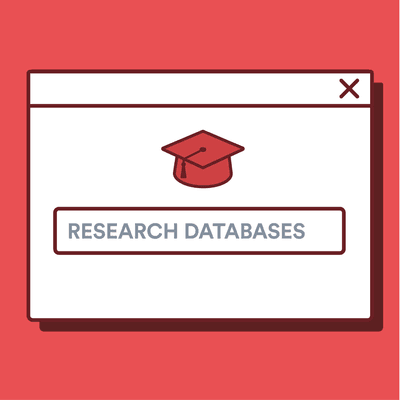
2. Web of Science
5. ieee xplore, 6. sciencedirect, 7. directory of open access journals (doaj), get the most out of your academic research database, frequently asked questions about academic research databases, related articles.
Whether you are writing a thesis , dissertation, or research paper it is a key task to survey prior literature and research findings. More likely than not, you will be looking for trusted resources, most likely peer-reviewed research articles.
Academic research databases make it easy to locate the literature you are looking for. We have compiled the top list of trusted academic resources to help you get started with your research:
Scopus is one of the two big commercial, bibliographic databases that cover scholarly literature from almost any discipline. Besides searching for research articles, Scopus also provides academic journal rankings, author profiles, and an h-index calculator .
- Coverage: 90.6 million core records
- References: N/A
- Discipline: Multidisciplinary
- Access options: Limited free preview, full access by institutional subscription only
- Provider: Elsevier
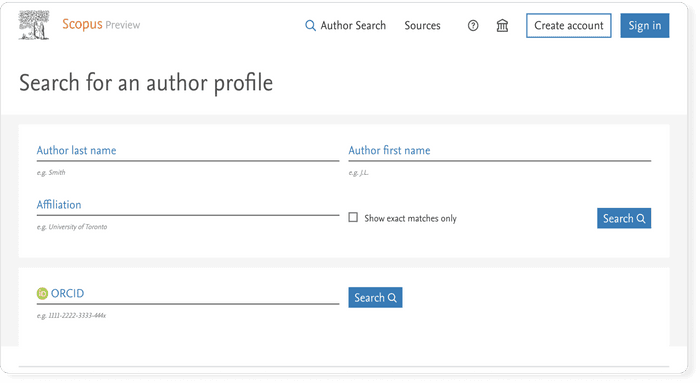
Web of Science also known as Web of Knowledge is the second big bibliographic database. Usually, academic institutions provide either access to Web of Science or Scopus on their campus network for free.
- Coverage: approx. 100 million items
- References: 1.4 billion
- Access options: institutional subscription only
- Provider: Clarivate (formerly Thomson Reuters)
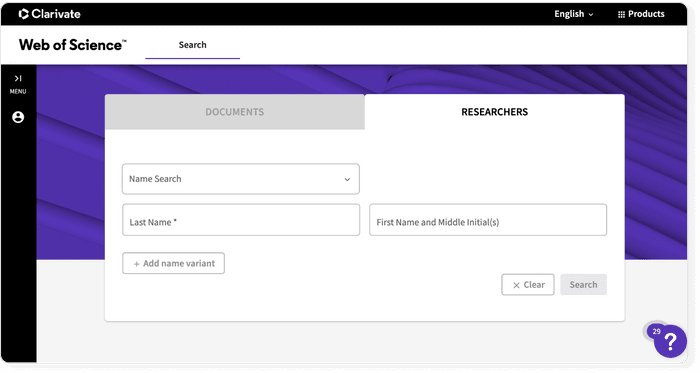
PubMed is the number one resource for anyone looking for literature in medicine or biological sciences. PubMed stores abstracts and bibliographic details of more than 30 million papers and provides full text links to the publisher sites or links to the free PDF on PubMed Central (PMC) .
- Coverage: approx. 35 million items
- Discipline: Medicine and Biological Sciences
- Access options: free
- Provider: NIH
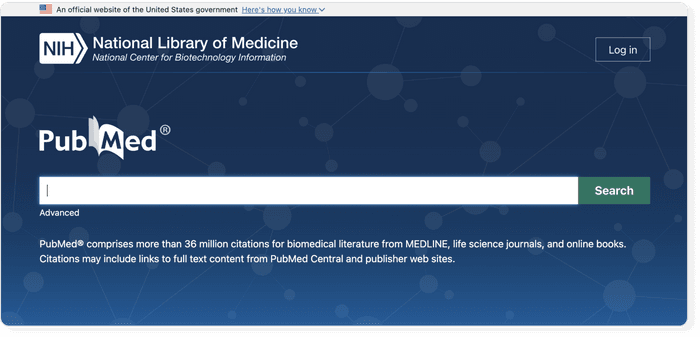
For education sciences, ERIC is the number one destination. ERIC stands for Education Resources Information Center, and is a database that specifically hosts education-related literature.
- Coverage: approx. 1.6 million items
- Discipline: Education
- Provider: U.S. Department of Education
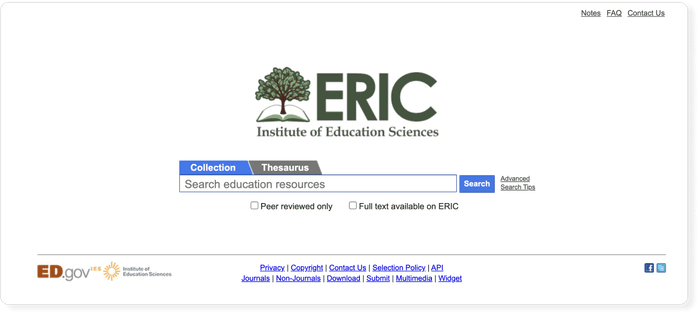
IEEE Xplore is the leading academic database in the field of engineering and computer science. It's not only journal articles, but also conference papers, standards and books that can be search for.
- Coverage: approx. 6 million items
- Discipline: Engineering
- Provider: IEEE (Institute of Electrical and Electronics Engineers)
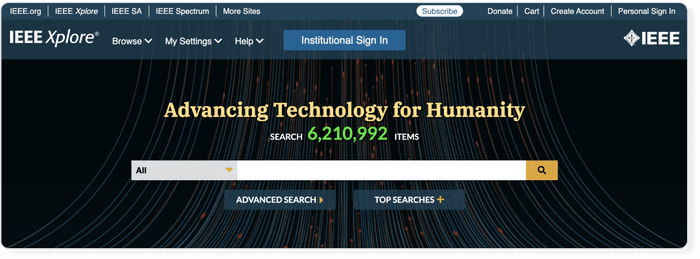
ScienceDirect is the gateway to the millions of academic articles published by Elsevier, 1.4 million of which are open access. Journals and books can be searched via a single interface.
- Coverage: approx. 19.5 million items
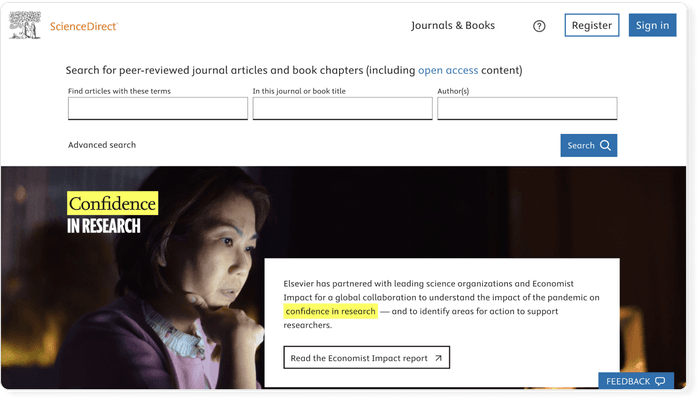
The DOAJ is an open-access academic database that can be accessed and searched for free.
- Coverage: over 8 million records
- Provider: DOAJ
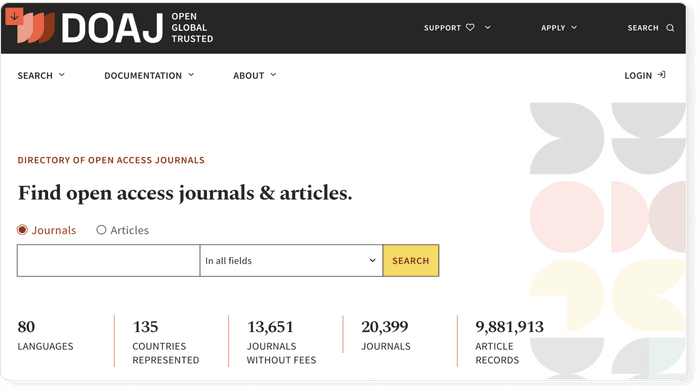
JSTOR is another great resource to find research papers. Any article published before 1924 in the United States is available for free and JSTOR also offers scholarships for independent researchers.
- Coverage: more than 12 million items
- Provider: ITHAKA
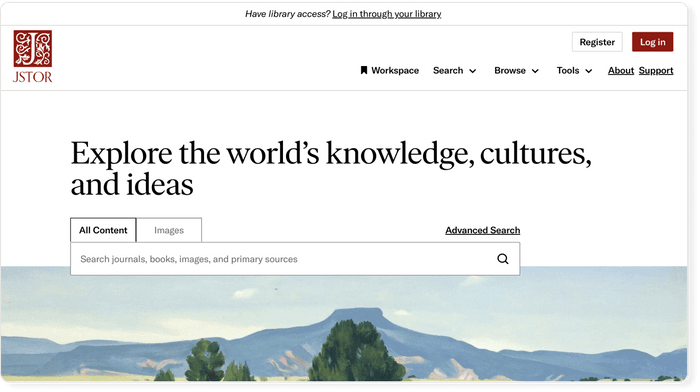
Start using a reference manager like Paperpile to save, organize, and cite your references. Paperpile integrates with PubMed and many popular databases, so you can save references and PDFs directly to your library using the Paperpile buttons:
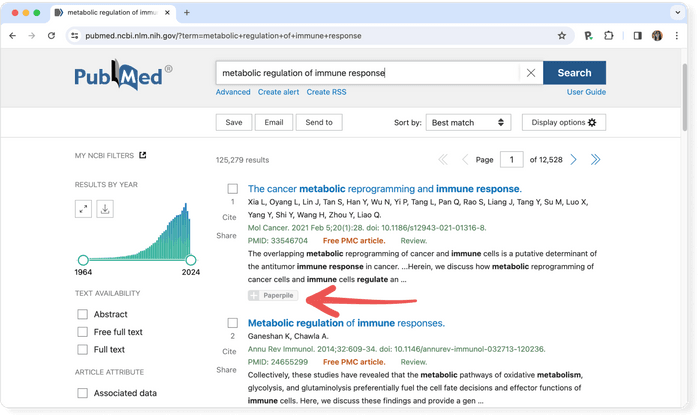
Scopus is one of the two big commercial, bibliographic databases that cover scholarly literature from almost any discipline. Beside searching for research articles, Scopus also provides academic journal rankings, author profiles, and an h-index calculator .
PubMed is the number one resource for anyone looking for literature in medicine or biological sciences. PubMed stores abstracts and bibliographic details of more than 30 million papers and provides full text links to the publisher sites or links to the free PDF on PubMed Central (PMC)
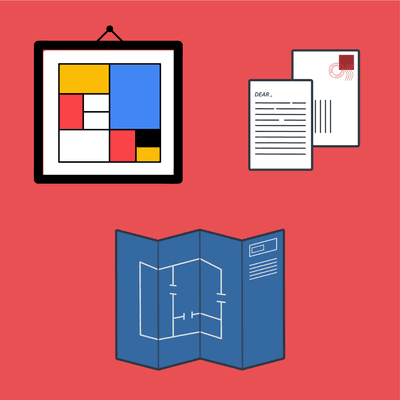
Have a language expert improve your writing
Run a free plagiarism check in 10 minutes, generate accurate citations for free.
- Knowledge Base
- Working with sources
How to Find Sources | Scholarly Articles, Books, Etc.
Published on June 13, 2022 by Eoghan Ryan . Revised on May 31, 2023.
It’s important to know how to find relevant sources when writing a research paper , literature review , or systematic review .
The types of sources you need will depend on the stage you are at in the research process , but all sources that you use should be credible , up to date, and relevant to your research topic.
There are three main places to look for sources to use in your research:
Research databases
- Your institution’s library
- Other online resources
Table of contents
Library resources, other online sources, other interesting articles, frequently asked questions about finding sources.
You can search for scholarly sources online using databases and search engines like Google Scholar . These provide a range of search functions that can help you to find the most relevant sources.
If you are searching for a specific article or book, include the title or the author’s name. Alternatively, if you’re just looking for sources related to your research problem , you can search using keywords. In this case, it’s important to have a clear understanding of the scope of your project and of the most relevant keywords.
Databases can be general (interdisciplinary) or subject-specific.
- You can use subject-specific databases to ensure that the results are relevant to your field.
- When using a general database or search engine, you can still filter results by selecting specific subjects or disciplines.
Example: JSTOR discipline search filter
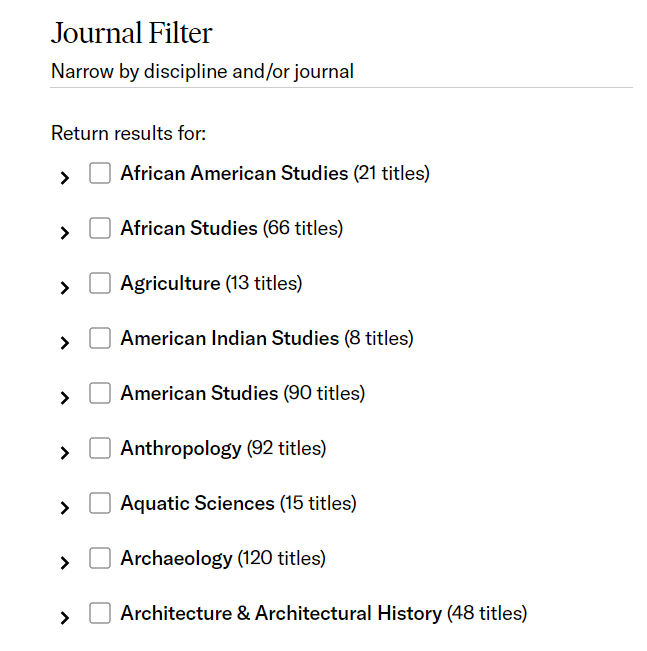
Check the table below to find a database that’s relevant to your research.
Google Scholar
To get started, you might also try Google Scholar , an academic search engine that can help you find relevant books and articles. Its “Cited by” function lets you see the number of times a source has been cited. This can tell you something about a source’s credibility and importance to the field.
Example: Google Scholar “Cited by” function

Boolean operators
Boolean operators can also help to narrow or expand your search.
Boolean operators are words and symbols like AND , OR , and NOT that you can use to include or exclude keywords to refine your results. For example, a search for “Nietzsche NOT nihilism” will provide results that include the word “Nietzsche” but exclude results that contain the word “nihilism.”
Many databases and search engines have an advanced search function that allows you to refine results in a similar way without typing the Boolean operators manually.
Example: Project Muse advanced search
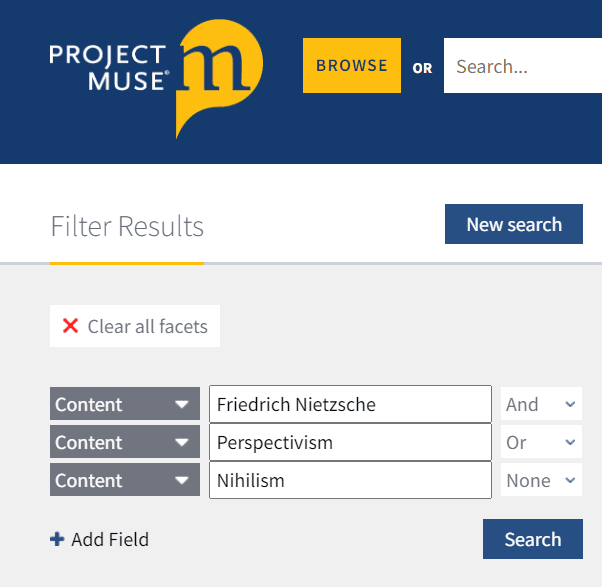
The only proofreading tool specialized in correcting academic writing - try for free!
The academic proofreading tool has been trained on 1000s of academic texts and by native English editors. Making it the most accurate and reliable proofreading tool for students.

Try for free
You can find helpful print sources in your institution’s library. These include:
- Journal articles
- Encyclopedias
- Newspapers and magazines
Make sure that the sources you consult are appropriate to your research.
You can find these sources using your institution’s library database. This will allow you to explore the library’s catalog and to search relevant keywords. You can refine your results using Boolean operators .
Once you have found a relevant print source in the library:
- Consider what books are beside it. This can be a great way to find related sources, especially when you’ve found a secondary or tertiary source instead of a primary source .
- Consult the index and bibliography to find the bibliographic information of other relevant sources.
You can consult popular online sources to learn more about your topic. These include:
- Crowdsourced encyclopedias like Wikipedia
You can find these sources using search engines. To refine your search, use Boolean operators in combination with relevant keywords.
However, exercise caution when using online sources. Consider what kinds of sources are appropriate for your research and make sure the sites are credible .
Look for sites with trusted domain extensions:
- URLs that end with .edu are educational resources.
- URLs that end with .gov are government-related resources.
- DOIs often indicate that an article is published in a peer-reviewed , scientific article.
Other sites can still be used, but you should evaluate them carefully and consider alternatives.
If you want to know more about ChatGPT, AI tools , citation , and plagiarism , make sure to check out some of our other articles with explanations and examples.
- ChatGPT vs human editor
- ChatGPT citations
- Is ChatGPT trustworthy?
- Using ChatGPT for your studies
- What is ChatGPT?
- Chicago style
- Paraphrasing
Plagiarism
- Types of plagiarism
- Self-plagiarism
- Avoiding plagiarism
- Academic integrity
- Consequences of plagiarism
- Common knowledge
Scribbr Citation Checker New
The AI-powered Citation Checker helps you avoid common mistakes such as:
- Missing commas and periods
- Incorrect usage of “et al.”
- Ampersands (&) in narrative citations
- Missing reference entries

You can find sources online using databases and search engines like Google Scholar . Use Boolean operators or advanced search functions to narrow or expand your search.
For print sources, you can use your institution’s library database. This will allow you to explore the library’s catalog and to search relevant keywords.
It is important to find credible sources and use those that you can be sure are sufficiently scholarly .
- Consult your institute’s library to find out what books, journals, research databases, and other types of sources they provide access to.
- Look for books published by respected academic publishing houses and university presses, as these are typically considered trustworthy sources.
- Look for journals that use a peer review process. This means that experts in the field assess the quality and credibility of an article before it is published.
When searching for sources in databases, think of specific keywords that are relevant to your topic , and consider variations on them or synonyms that might be relevant.
Once you have a clear idea of your research parameters and key terms, choose a database that is relevant to your research (e.g., Medline, JSTOR, Project MUSE).
Find out if the database has a “subject search” option. This can help to refine your search. Use Boolean operators to combine your keywords, exclude specific search terms, and search exact phrases to find the most relevant sources.
There are many types of sources commonly used in research. These include:
You’ll likely use a variety of these sources throughout the research process , and the kinds of sources you use will depend on your research topic and goals.
Scholarly sources are written by experts in their field and are typically subjected to peer review . They are intended for a scholarly audience, include a full bibliography, and use scholarly or technical language. For these reasons, they are typically considered credible sources .
Popular sources like magazines and news articles are typically written by journalists. These types of sources usually don’t include a bibliography and are written for a popular, rather than academic, audience. They are not always reliable and may be written from a biased or uninformed perspective, but they can still be cited in some contexts.
Cite this Scribbr article
If you want to cite this source, you can copy and paste the citation or click the “Cite this Scribbr article” button to automatically add the citation to our free Citation Generator.
Ryan, E. (2023, May 31). How to Find Sources | Scholarly Articles, Books, Etc.. Scribbr. Retrieved April 9, 2024, from https://www.scribbr.com/working-with-sources/finding-sources/
Is this article helpful?

Eoghan Ryan
Other students also liked, types of sources explained | examples & tips, primary vs. secondary sources | difference & examples, boolean operators | quick guide, examples & tips, unlimited academic ai-proofreading.
✔ Document error-free in 5minutes ✔ Unlimited document corrections ✔ Specialized in correcting academic texts
Thank you for visiting nature.com. You are using a browser version with limited support for CSS. To obtain the best experience, we recommend you use a more up to date browser (or turn off compatibility mode in Internet Explorer). In the meantime, to ensure continued support, we are displaying the site without styles and JavaScript.
- View all journals
- Explore content
- About the journal
- Publish with us
- Sign up for alerts
Research articles
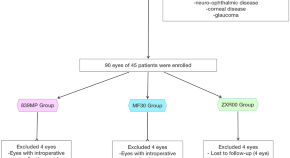
Visual outcomes and patient satisfaction after implantations of three types of presbyopia-correcting intraocular lenses that have undergone corneal refractive surgery
- Baoxian Zhuo

Highly biomimetic spiking neuron using SiGe heterojunction bipolar transistors for energy-efficient neuromorphic systems
- Hyangwoo Kim
- Chang-Ki Baek
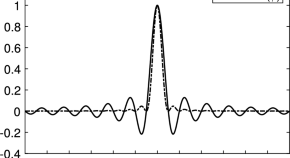
Numerical subgrid Bi-cubic methods of partial differential equations in image segmentation
- Dongyung Kim
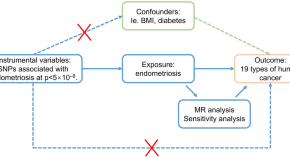
Genetically identification of endometriosis and cancers risk in women through a two-sample Mendelian randomization study
- Huaqing Yan
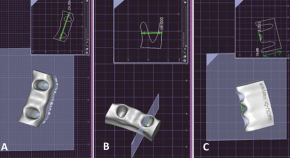
Effect of a novel mesh design and the sandblasting technique on the bond strength of computer-designed and three-dimension laser printed resin bonded bridges: an in vitro study
- Mariam Diab
- Mawia Karkoutly
- Jihad Abou Nassar
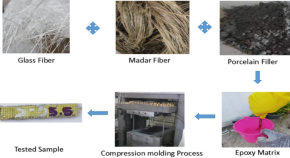
Fabrication of glass/madar fibers reinforced hybrid epoxy composite: a comprehensive study on the material stability
- Thandavamoorthy Raja
- D. Yuvarajan
- Nandagopal Kaliappan
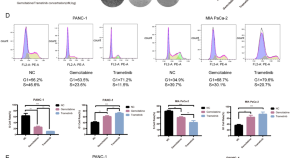
CDK4/6 inhibition sensitizes MEK inhibition by inhibiting cell cycle and proliferation in pancreatic ductal adenocarcinoma
- Zijian Zhou
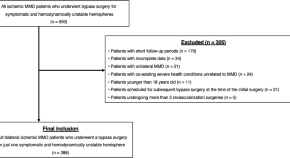
Natural course of hemodynamically stable hemispheres contralateral to operated hemispheres in adult patients with ischemic moyamoya diseases
- Young Sill Kang
- Won-Sang Cho
- Jeong Eun Kim
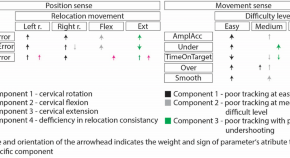
Cervicocephalic kinaesthesia reveals novel subgroups of motor control impairments in patients with neck pain
- Ziva Majcen Rosker
- Jernej Rosker
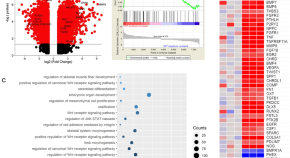
Ablation of Wnt signaling in bone marrow stromal cells overcomes microenvironment-mediated drug resistance in acute myeloid leukemia
- Hamenth Kumar Palani
- Saravanan Ganesan
- Vikram Mathews
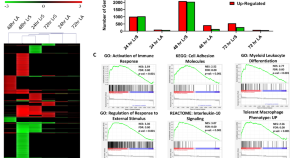
A Lacticaseibacillus rhamnosus secretome induces immunoregulatory transcriptional, functional and immunometabolic signatures in human THP-1 monocytes
- Michael P. Jeffrey
- Julia M. Green-Johnson
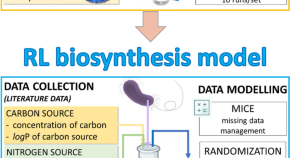
Microbe cultivation guidelines to optimize rhamnolipid applications
- Ilona E. Kłosowska-Chomiczewska
- Adam Macierzanka
- Christian Jungnickel

Comprehensive assessment of goat adipose tissue-derived mesenchymal stem cells cultured in different media
- Michelle Abraham
- Sandeep Goel
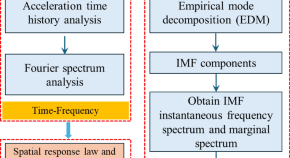
Experimental analysis of rotating bridge structural responses to existing railway train loads via time–frequency and Hilbert–Huang transform energy spectral analysis
- Honggang Wu
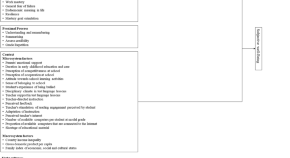
Identifying the top predictors of student well-being across cultures using machine learning and conventional statistics
- Ronnel B. King
- Shing On Leung
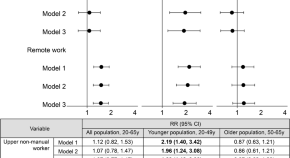
Incidence of coronary heart disease among remote workers: a nationwide web-based cohort study
- Masayoshi Zaitsu
- Tomohiro Ishimaru
- Yoshihisa Fujino
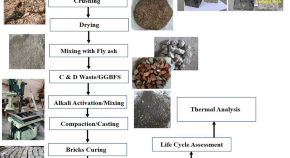
Large CO 2 reduction and enhanced thermal performance of agro-forestry, construction and demolition waste based fly ash bricks for sustainable construction
- Siddharth Singh
- Soumitra Maiti
- Sameer Yadav

Fetal and neonatal outcomes of posterior fossa anomalies: a retrospective cohort study
- Hanan Alsehli
- Saeed Mastour Alshahrani
- Duaa Baarmah
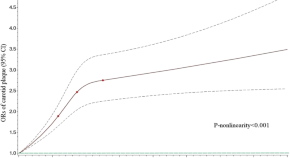
Remnant cholesterol and the risk of carotid plaque in hypertension: results from a community-based screening among old adults in Hangzhou, China
- Haifeng Yang
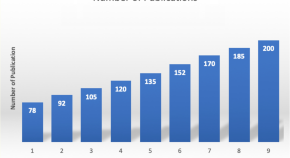
HARNet in deep learning approach—a systematic survey
- Neelam Sanjeev Kumar
- Baseem Khan
Quick links
- Explore articles by subject
- Guide to authors
- Editorial policies
- Hot Tech Deals at Target Right Now
- The Best Noise-Canceling Headphones to Buy
The Best Research and Reference Websites
Where to look when you need information
:max_bytes(150000):strip_icc():format(webp)/stacy-fisher-9842c081a15b4def99bfd26b4822be19.jpg)
- Emporia State University
- Cloud Services
- Error Messages
- Family Tech
- Home Networking
- Around the Web
Research websites come in handy in all kinds of situations, whether you're looking for the average rainfall in the Amazon rainforest, researching Roman history, or just having fun learning to find information.
This list of the best research websites will help greatly, and most of them are updated daily with new information.
I like to pair these sites with free research organizational tools to keep track of everything I gather online.
Best Research Websites
- Library of Congress : LOC.gov lets you not only ask a librarian for help , but also search catalogs of libraries from all over the world. This is truly a huge resource that should be on your Top 10 best research sites list. Anything from Academia Sinica in Taiwan to Yale University in the U.S. is here and ready to be searched.
- ReferenceDesk.org : Dubbed "The Internet's Best Reference Source," this extremely useful web directory provides everything from business and finance information to federal government resources, scholarship details, links to newspapers and calendars, search engines, and more.
- Ask the Space Expert: NASA's source for space and science research help. Use the video links to listen to questions answered by experts. These are from 2013 through 2015.
- USA.gov : This is where you should start when looking for specific U.S. government information. Learn about the country in general or education, housing, disability services, jobs, taxes, laws, and more.
- Reference.com : Extremely simple to use with a basic layout, this reference website lets you browse by category or search by keywords to research everything from food and health to history, beauty, education, technology, vehicles, art, and more.
- Refdesk.com : Billing itself as the internet's fact-checker, this site includes in-depth research links to breaking news, editorials, Today in History, Word of the Day, and other references.
- Encyclopedia.com : The #1 online encyclopedia that lets you search over 200 reference books and encyclopedias at once. The Picks of the week is a neat section to examine each week.
- Encyclopedia Britannica : One of the world's oldest encyclopedias online; has featured posts and category listings. The company launched in the 18th century and has been publishing exclusively online since 2011.
- Purdue University Quick Reference : This site has tons of information that includes resources specific to Purdue University and surrounding areas in Indiana. It also includes an Ask a Librarian service.
- Prescriber's Digital Reference : A wonderful research tool when gathering detailed medical information. The drug name browser includes summaries (dosage, description, and more) for hundreds of drugs.
- iTools.com : Serves as a gateway for reference and research links. It uses other websites for its searches, like YouTube and Google.
- ResearchGate : Scientific knowledge from over 160 million publication pages; browse topics in categories like engineering, biology, climate change, medicine, math, and more.
- Baseball-Reference.com : Here's everything you ever wanted to know about baseball.
- FOLDOC : Free Online Dictionary of Computing is a detailed computing dictionary for researching the meaning behind computer-related tools, standards, jargon, languages, and more. The "random" button is a fun way to learn new concepts.
Depending on the type of research you're doing or how you need to reference the information, you may need quick access to books. There are lots of places to find free book downloads , textbooks , and educational movies .
Other Ways to Do Research
Search engines like Google are a great way to perform online research. You can locate books, articles, interviews, and lots more. Learn how to search better to get the most out of your research.
Another top source of expert information is your local librarian— search for libraries near you at WorldCat . Librarians are trained to find answers to obscure questions, they're friendly, and best of all, you can talk with them face to face. They often ask you questions you might not have considered, leading to even better results. You can get help from librarians online, too, through some of the sources above.
Get the Latest Tech News Delivered Every Day
- 17 Best Sites to Download Free Books in 2024
- The 8 Best Free Genealogy Websites of 2024
- The Best Free People Search Websites
- The 10 Best ChatGPT Alternatives (2024)
- The 20 Best Free Learning Websites for Kids in 2024
- The 8 Best Search Engines of 2024
- 22 Best Places to Get Free Kindle Books in 2024
- X Slang and Key Terms Explained
- 13 Best Sites With Free Educational Movies
- The 10 Best Free Online Classes for Adults in 2024
- The 60 Most Useful Alexa Skills of 2024
- The Best Image Search Engines on the Web
- The 7 Best Free PC Game Websites of 2024
- 15 Best Free Web Tools to Organize Your Research
- 9 Best Sites for Public Domain Images
- The 45 Most Useful Sites on the Web
Academia.edu no longer supports Internet Explorer.
To browse Academia.edu and the wider internet faster and more securely, please take a few seconds to upgrade your browser .
Download 55 million PDFs for free
Explore our top research interests.

Engineering

Anthropology

- Earth Sciences

- Computer Science

- Mathematics

- Health Sciences

Join 257 million academics and researchers
Track your impact.
Share your work with other academics, grow your audience and track your impact on your field with our robust analytics
Discover new research
Get access to millions of research papers and stay informed with the important topics around the world
Publish your work
Publish your research with fast and rigorous service through Academia.edu Publishing. Get instant worldwide dissemination of your work
Unlock the most powerful tools with Academia Premium

Work faster and smarter with advanced research discovery tools
Search the full text and citations of our millions of papers. Download groups of related papers to jumpstart your research. Save time with detailed summaries and search alerts.
- Advanced Search
- PDF Packages of 37 papers
- Summaries and Search Alerts

Share your work, track your impact, and grow your audience
Get notified when other academics mention you or cite your papers. Track your impact with in-depth analytics and network with members of your field.
- Mentions and Citations Tracking
- Advanced Analytics
- Publishing Tools
Real stories from real people

Used by academics at over 16,000 universities

Get started and find the best quality research
- Academia.edu Publishing
- We're Hiring!
- Help Center
- Find new research papers in:
- Cognitive Science
- Academia ©2024
Navigation group
Home banner.

Where scientists empower society
Creating solutions for healthy lives on a healthy planet.
most-cited publisher
largest publisher
2.5 billion
article views and downloads
Main Content
- Editors and reviewers
- Collaborators

Find a journal
We have a home for your research. Our community led journals cover more than 1,500 academic disciplines and are some of the largest and most cited in their fields.

Submit your research
Start your submission and get more impact for your research by publishing with us.

Author guidelines
Ready to publish? Check our author guidelines for everything you need to know about submitting, from choosing a journal and section to preparing your manuscript.

Peer review
Our efficient collaborative peer review means you’ll get a decision on your manuscript in an average of 61 days.

Article publishing charges (APCs) apply to articles that are accepted for publication by our external and independent editorial boards

Press office
Visit our press office for key media contact information, as well as Frontiers’ media kit, including our embargo policy, logos, key facts, leadership bios, and imagery.

Institutional partnerships
Join more than 555 institutions around the world already benefiting from an institutional membership with Frontiers, including CERN, Max Planck Society, and the University of Oxford.

Publishing partnerships
Partner with Frontiers and make your society’s transition to open access a reality with our custom-built platform and publishing expertise.

Policy Labs
Connecting experts from business, science, and policy to strengthen the dialogue between scientific research and informed policymaking.


How we publish
All Frontiers journals are community-run and fully open access, so every research article we publish is immediately and permanently free to read.

Editor guidelines
Reviewing a manuscript? See our guidelines for everything you need to know about our peer review process.

Become an editor
Apply to join an editorial board and collaborate with an international team of carefully selected independent researchers.

My assignments
It’s easy to find and track your editorial assignments with our platform, 'My Frontiers' – saving you time to spend on your own research.

Scientists call for urgent action to prevent immune-mediated illnesses caused by climate change and biodiversity loss
Climate change, pollution, and collapsing biodiversity are damaging our immune systems, but improving the environment offers effective and fast-acting protection.

Safeguarding peer review to ensure quality at scale
Making scientific research open has never been more important. But for research to be trusted, it must be of the highest quality. Facing an industry-wide rise in fraudulent science, Frontiers has increased its focus on safeguarding quality.

Chronic stress and inflammation linked to societal and environmental impacts in new study
Scientists hypothesize that as-yet unrecognized inflammatory stress is spreading among people at unprecedented rates, affecting our cognitive ability to address climate change, war, and other critical issues.

Tiny crustaceans discovered preying on live jellyfish during harsh Arctic night
Scientists used DNA metabarcoding to show for the first time that jellyfish are an important food for amphipods during the Arctic polar night in waters off Svalbard, at a time of year when other food resources are scarce.

Why studying astronauts’ microbiomes is crucial to ensure deep space mission success
In a new Frontiers’ guest editorial, Prof Dr Lembit Sihver, director of CRREAT at the Nuclear Physics Institute of the Czech Academy of Sciences and his co-authors explore the impact the microbiome has on human health in space.

Cake and cookies may increase Alzheimer’s risk: Here are five Frontiers articles you won’t want to miss
At Frontiers, we bring some of the world’s best research to a global audience. But with tens of thousands of articles published each year, it’s impossible to cover all of them. Here are just five amazing papers you may have missed.

2024's top 10 tech-driven Research Topics
Frontiers has compiled a list of 10 Research Topics that embrace the potential of technology to advance scientific breakthroughs and change the world for the better.
Get the latest research updates, subscribe to our newsletter
Top Science News
Latest top headlines.
- Mental Health
- Alternative Medicine
- Diseases and Conditions
- Immune System
- Parkinson's Research
- Organic Chemistry
- Inorganic Chemistry
- Oceanography
- Space Telescopes
- Space Exploration
- Astrophysics
- Dark Matter
- Extrasolar Planets
- Solar System
- New Species
- Evolutionary Biology
- Dolphins and Whales
- Global Warming
- Asteroids, Comets and Meteors
- Friendly Pat On the Back: Free Throws
- A Welcome Hug Is Good for Your Health
- A Neurodegenerative Disease Triggered by Virus
- Drug Development Made Easier
Top Physical/Tech
- Tiny Plastic Particles Are Found Everywhere
- Unprecedented Behavior from Nearby Magnetar
- Precise Measurement of Our Expanding Universe
- 'Rainbow' Detected On an Exoplanet
Top Environment
- Do Odd Bones Belong to Gigantic Ichthyosaurs?
- Big-Eyed Marine Worm: Secret Language?
- Toothed Whale Echolocation and Jaw Muscles
- Climate Change Threatens Antarctic Meteorites
Health News
Latest health headlines.
- Human Biology
- Personalized Medicine
- Health Policy
- Patient Education and Counseling
- Birth Control
- Mental Health Research
- Alzheimer's
- Alzheimer's Research
- Brain Tumor
- Neuroscience
- Intelligence
- Brain-Computer Interfaces
- Brain Injury
- Computers and Internet
- Consumer Behavior
- Racial Issues
- Workplace Health
- Poverty and Learning
- Child Development
- Infant and Preschool Learning
- Language Acquisition
Health & Medicine
- Genomic Architecture of Inherited DNA Variants
- Helping Kids Build Tolerance to Food Allergens
- Heart Disease, Depression Linked by Inflammation
- Tiny Brain Bubbles Carry Complete Codes
Mind & Brain
- New Light Shed On Memory and Learning
- Inner Workings of the Brain
- Early Detection of Cognitive Decline
- Understanding Neurons: Spike-Sorting Software
Living Well
- Helping People Improve Self-Control
- Short-Term Incentives for Exercise Work
- Fitness in Youth: Ability to Work as Adults
- Talk to Your Baby: It Matters
Physical/Tech News
Latest physical/tech headlines.
- Energy and the Environment
- Renewable Energy
- Solar Energy
- Energy Technology
- Heart Disease
- Today's Healthcare
- Telecommunications
- Eris (Xena)
- Black Holes
- Quantum Computers
- Spintronics
- Spintronics Research
- Computer Modeling
- Mathematical Modeling
- Environmental Awareness
- Environmental Policy
Matter & Energy
- More Efficient Organic Solar Cells
- Device Gathers, Stores Electricity
- Novel Heart Artery Repair
- Curving Light for Better Wireless Communication
Space & Time
- Neutron Stars and Elusive Dark Matter
- Inexplicable Flying Fox in Hydra Galaxy Cluster
- Astronomy: How Do Brown Dwarfs Form?
- Chemical Reactions Can Scramble Quantum Info
Computers & Math
- Resistance-Free Electron Channels
- Can Language Models Read the Genome?
- Climate, Agriculture and Financial Institutions
- AI at the Service of Heart Research
Environment News
Latest environment headlines.
- Sustainability
- Environmental Issues
- Early Birds
- Bird Flu Research
- Frogs and Reptiles
- Wild Animals
- Ecology Research
- Biodiversity
- Alternative Fuels
- Energy and Resources
- Ancient Civilizations
- Archaeology
- Anthropology
- Geomagnetic Storms
- Origin of Life
- Charles Darwin
- Molecular Biology
Plants & Animals
- Microbial Plastic Factory for Quality Plastic
- Climate Change and Madagascar's Megadrought
- Birdfeeders Are for the Birds
- 'Teacher Toads' and Toxic Cane Toads
Earth & Climate
- Impact of Climate Change On Marine Life
- Humans Can Increase Biodiversity
- Subterranean Storage of Hydrogen
- Humans Converting Estuaries Into Cities, Farms
Fossils & Ruins
- Early Medieval Money Mystery Solved
- Tracing the Largest Solar Storm in Modern Times
- Prebiotic Molecular Kitchen
- Britain Began Industrializing in 17th Century
Society/Education News
Latest society/education headlines.
- Children's Health
- Infant's Health
- Disaster Plan
- Social Issues
- Natural Disasters
- Air Quality
- Environmental Policies
- Child Psychology
- K-12 Education
- Sleep Disorders
- Social Psychology
- Relationships
- Energy Issues
- Educational Psychology
- Gender Difference
Science & Society
- Parental Leave Policy and Premature Babies
- Social Media Use During Disasters
- Atmospheric, Economic Drivers of Air Pollution
- Are Lab-Grown Brain Tissues Ethical?
Education & Learning
- Exercise Habits in Youth, Good Health Later
- Universities Connected to Local Sustainability?
- Early Detection of Language Disorders Key
- Why Do Some Memories Become Longterm?
Business & Industry
- Active Workstations and Cognitive Performance
- Suppressing Boredom at Work Hurts Productivity
- Pairing Crypto Mining With Green Hydrogen
- Feeling Apathetic? There May Be Hope
- Pregnancy Accelerates Biological Aging
- What's Quieter Than a Fish? A School of Them
- Soft, Flexible 'Skeletons' for 'Muscular' Robots
- How the Moon Turned Itself Inside Out
Trending Topics
Strange & offbeat, about this site.
ScienceDaily features breaking news about the latest discoveries in science, health, the environment, technology, and more -- from leading universities, scientific journals, and research organizations.
Visitors can browse more than 500 individual topics, grouped into 12 main sections (listed under the top navigational menu), covering: the medical sciences and health; physical sciences and technology; biological sciences and the environment; and social sciences, business and education. Headlines and summaries of relevant news stories are provided on each topic page.
Stories are posted daily, selected from press materials provided by hundreds of sources from around the world. Links to sources and relevant journal citations (where available) are included at the end of each post.
For more information about ScienceDaily, please consult the links listed at the bottom of each page.
Subscribe or renew today
Every print subscription comes with full digital access
Science News

What Science News saw during the solar eclipse
Science News staffers took to different parts of the United States to take in the eclipse’s glow. Here’s a glimpse of what we saw during the 2024 event.

Flowers may be big antennas for bees’ electrical signals

A protein found in sweat may protect people from Lyme disease

Polar forests may have just solved a solar storm mystery

During the awe of totality, scientists studied our planet’s reactions

Heat waves cause more illness and death in U.S. cities with fewer trees

Your last-minute guide to the 2024 total solar eclipse
Trending stories.

A new look at Ötzi the Iceman’s DNA reveals new ancestry and other surprises

Explore a map of the next 15 total solar eclipses

Why the 2024 total solar eclipse will be such a big deal

Sign Up For the Latest from Science News
Headlines and summaries of the latest Science News articles, delivered to your inbox
Thank you for signing up!
There was a problem signing you up.
Total Solar Eclipse 2024

The sun will be very active during the next solar eclipse to cross North America, making it an excellent viewing and scientific opportunity.
Here’s how citizen scientists can help during the 2024 solar eclipse
From the archives.

How to Stop a Biological Clock
March 9, 1974 Vol. 105 No. #10
Science News Magazine

March 9, 2024 Vol. 205 No. 5
Here’s why blueberries are blue
Here’s how scientists reached nuclear fusion ‘ignition’ for the first time.

Featured Media

How brain implants are treating depression
This six-part series follows people whose lives have been changed by an experimental treatment called deep brain stimulation.

Explore the expected life spans of different dog breeds

Does this drone image show a newborn white shark? Experts aren’t sure

Parrots can move along thin branches using ‘beakiation’
How ghostly neutrinos could explain the universe’s matter mystery, follow science news.
- Follow Science News on X
- Follow Science News on Facebook
- Follow Science News on Instagram
More Stories

During a total solar eclipse, some colors really pop. Here’s why
This is the first egg-laying amphibian found to feed its babies ‘milk’, insects flocking to artificial lights may not know which way is up.

These are the chemicals that give teens pungent body odor
Here’s why covid-19 isn’t seasonal so far, human embryo replicas have gotten more complex. here’s what you need to know.

‘On the Move’ examines how climate change will alter where people live
Waterlogged soils can give hurricanes new life after they arrive on land, cold, dry snaps accompanied three plagues that struck the roman empire.

How a 19th century astronomer can help you watch the total solar eclipse
Jwst spies hints of a neutron star left behind by supernova 1987a, astronomers are puzzled over an enigmatic companion to a pulsar.

Physicists take a major step toward making a nuclear clock
A teeny device can measure subtle shifts in earth’s gravitational field, 50 years ago, superconductors were warming up, health & medicine.

Bird flu has infected a person after spreading to cows. Here’s what to know
A new study has linked microplastics to heart attacks and strokes. here’s what we know , how patient-led research could speed up medical innovation.

Earth’s oldest known earthquake was probably triggered by plate tectonics
Climate change is changing how we keep time, where are u.s. earthquakes most likely a new map shows the hazard risks, science & society.

Not all cultures value happiness over other aspects of well-being
Social media harms teens’ mental health, mounting evidence shows. what now, geneticist krystal tsosie advocates for indigenous data sovereignty.
Subscribers, enter your e-mail address for full access to the Science News archives and digital editions.
Not a subscriber? Become one now .
- Advanced search
- Peer review

Discover relevant research today

Advance your research field in the open

Reach new audiences and maximize your readership
ScienceOpen puts your research in the context of
Publications
For Publishers
ScienceOpen offers content hosting, context building and marketing services for publishers. See our tailored offerings
- For academic publishers to promote journals and interdisciplinary collections
- For open access journals to host journal content in an interactive environment
- For university library publishing to develop new open access paradigms for their scholars
- For scholarly societies to promote content with interactive features
For Institutions
ScienceOpen offers state-of-the-art technology and a range of solutions and services
- For faculties and research groups to promote and share your work
- For research institutes to build up your own branding for OA publications
- For funders to develop new open access publishing paradigms
- For university libraries to create an independent OA publishing environment
For Researchers
Make an impact and build your research profile in the open with ScienceOpen
- Search and discover relevant research in over 93 million Open Access articles and article records
- Share your expertise and get credit by publicly reviewing any article
- Publish your poster or preprint and track usage and impact with article- and author-level metrics
- Create a topical Collection to advance your research field
Create a Journal powered by ScienceOpen
Launching a new open access journal or an open access press? ScienceOpen now provides full end-to-end open access publishing solutions – embedded within our smart interactive discovery environment. A modular approach allows open access publishers to pick and choose among a range of services and design the platform that fits their goals and budget.
Continue reading “Create a Journal powered by ScienceOpen”
What can a Researcher do on ScienceOpen?
ScienceOpen provides researchers with a wide range of tools to support their research – all for free. Here is a short checklist to make sure you are getting the most of the technological infrastructure and content that we have to offer. What can a researcher do on ScienceOpen? Continue reading “What can a Researcher do on ScienceOpen?”
ScienceOpen on the Road
Upcoming events.
- 20 – 22 February – ResearcherToReader Conferece
Past Events
- 09 November – Webinar for the Discoverability of African Research
- 26 – 27 October – Attending the Workshop on Open Citations and Open Scholarly Metadata
- 18 – 22 October – ScienceOpen at Frankfurt Book Fair.
- 27 – 29 September – Attending OA Tage, Berlin .
- 25 – 27 September – ScienceOpen at Open Science Fair
- 19 – 21 September – OASPA 2023 Annual Conference .
- 22 – 24 May – ScienceOpen sponsoring Pint of Science, Berlin.
- 16-17 May – ScienceOpen at 3rd AEUP Conference.
- 20 – 21 April – ScienceOpen attending Scaling Small: Community-Owned Futures for Open Access Books .
- 18 – 20 April – ScienceOpen at the London Book Fair .
What is ScienceOpen?
- Smart search and discovery within an interactive interface
- Researcher promotion and ORCID integration
- Open evaluation with article reviews and Collections
- Business model based on providing services to publishers
Live Twitter stream
Some of our partners:.

Ask a question, get an answer backed by real research

1.2b citation statements extracted and analyzed
187 m articles, book chapters, preprints, and datasets.
Trusted by leading Universities, Publishers, and Corporations across the world.
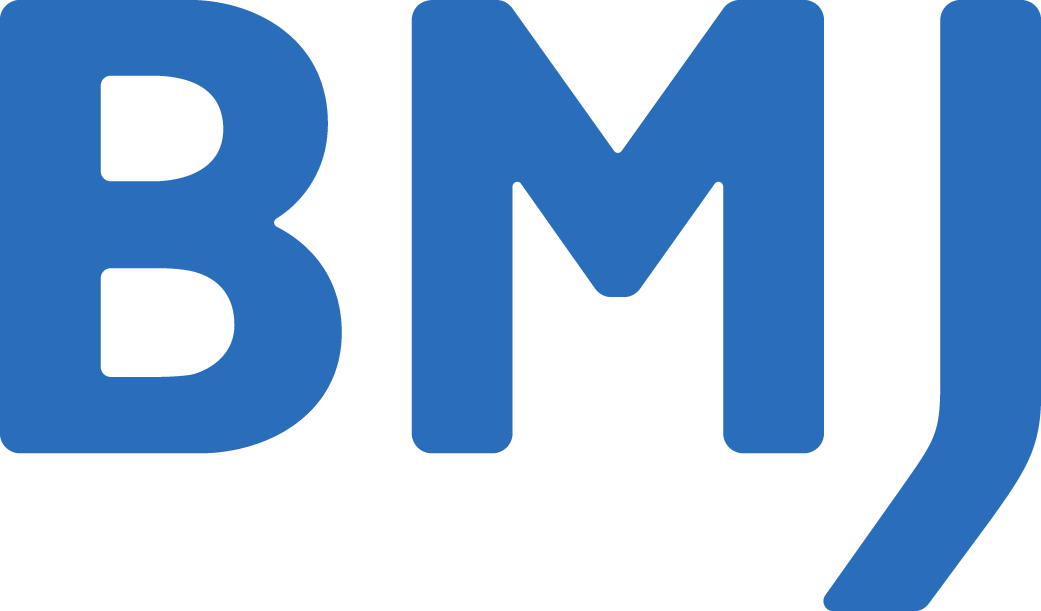
Read what research articles say about each other
scite is an award-winning platform for discovering and evaluating scientific articles via Smart Citations. Smart Citations allow users to see how a publication has been cited by providing the context of the citation and a classification describing whether it provides supporting or contrasting evidence for the cited claim.
Extracted citations in a report page
Never waste time looking for and evaluating research again.
Our innovative index of Smart Citations powers new features built to make research intuitive and trustworthy for anyone engaging with research.
Search Citation Statements
Find information by searching across a mix of metadata (like titles & abstracts) as well as Citation Statements we indexed from the full-text of research articles.
Create Custom Dashboards
Build and manage collections of articles of interest -- from a manual list, systematic review, or a search -- and get aggregate insights, notifications, and more.
Reference Check
Evaluate how references from your manuscript were used by you or your co-authors to ensure you properly cite high quality references.
Journal Metrics
Explore pre-built journal dashboards to find their publications, top authors, compare yearly scite Index rankings in subject areas, and more.
Large Language Model (LLM) Experience for Researchers
Assistant by scite gives you the power of large language models backed by our unique database of Smart Citations to minimize the risk of hallucinations and improve the quality of information and real references.
Use it to get ideas for search strategies, build reference lists for a new topic you're exploring, get help writing marketing and blog posts, and more.
Assistant is built with observability in mind to help you make more informed decisions about AI generated content.
Here are a few examples to try:
"How many rats live in NYC?"
"How does the structure of a protein affect its function?"
Awards & Press
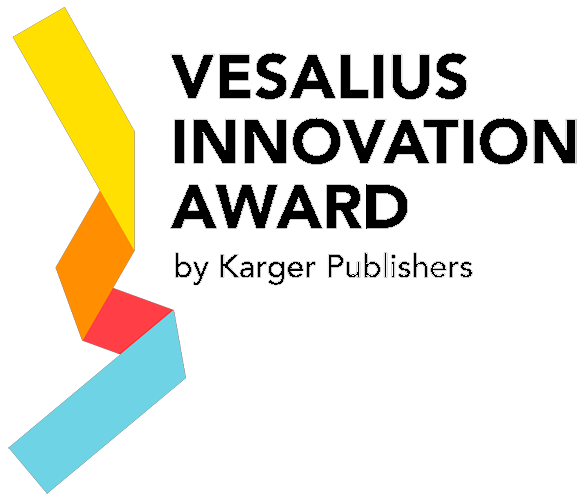
Trusted by researchers and organizations around the world
Over 650,000 students, researchers, and industry experts use scite
See what they're saying

scite is an incredibly clever tool. The feature that classifies papers on whether they find supporting or contrasting evidence for a particular publication saves so much time. It has become indispensable to me when writing papers and finding related work to cite and read.
Emir Efendić, Ph.D
Maastricht University

As a PhD student, I'm so glad that this exists for my literature searches and papers. Being able to assess what is disputed or affirmed in the literature is how the scientific process is supposed to work, and scite helps me do this more efficiently.
Kathleen C McCormick, Ph.D Student

scite is such an awesome tool! It’s never been easier to place a scientific paper in the context of the wider literature.
Mark Mikkelsen, Ph.D
The Johns Hopkins University School of Medicine

This is a really cool tool. I just tried it out on a paper we wrote on flu/pneumococcal seasonality... really interesting to see the results were affirmed by other studies. I had no idea.
David N. Fisman, Ph.D
University of Toronto

Do better research
Join scite to be a part of a community dedicated to making science more reliable.
scite is a Brooklyn-based organization that helps researchers better discover and understand research articles through Smart Citations–citations that display the context of the citation and describe whether the article provides supporting or contrasting evidence. scite is used by students and researchers from around the world and is funded in part by the National Science Foundation and the National Institute on Drug Abuse of the National Institutes of Health.
Contact Info
334 Leonard St
Brooklyn, NY 11211
Blog Terms and Conditions API Terms Privacy Policy Contact Cookie Preferences Do Not Sell or Share My Personal Information
Copyright © 2024 scite LLC. All rights reserved.
Made with 💙 for researchers
Part of the Research Solutions Family.
Read our research on: Gun Policy | International Conflict | Election 2024
Regions & Countries
What’s it like to be a teacher in america today, rising numbers of americans say jews and muslims face a lot of discrimination, changing partisan coalitions in a politically divided nation.
About half of registered voters (49%) identify as Democrats or lean toward the Democratic Party, while 48% identify as Republicans or lean Republican. In recent decades, neither party has had a sizable advantage, but the Democratic Party has lost the edge it maintained from 2017 to 2021.
7 facts about Americans and taxes
The hardships and dreams of asian americans living in poverty, sign up for our weekly newsletter.
Fresh data delivered Saturday mornings
Latest Publications
Amid shifts in demographics and partisan allegiances, registered voters are now evenly split between the Democratic Party and the GOP.
A majority of U.S. adults say they’re bothered a lot by the feeling that some corporations (61%) and some wealthy people (60%) don’t pay their fair share.
How common is religious fasting in the United States?
In the United States, 21% of adults overall say they fast for certain periods during holy times.
About half of Americans say public K-12 education is going in the wrong direction
A majority of those who say it’s headed in the wrong direction say a major reason is that schools are not spending enough time on core academic subjects.
What Public K-12 Teachers Want Americans To Know About Teaching
Many public K-12 teachers say people should know that teaching is hard job, and that teachers care about students and deserve respect.
Most Popular
Sign up for the briefing.
Weekly updates on the world of news & information
Politics & Policy
Americans’ top policy priority for 2024: strengthening the economy.
Growing shares of Republicans rate immigration and terrorism as top priorities for the president and Congress this year.
Majorities of adults see decline of union membership as bad for the U.S. and working people
How republicans view climate change and energy issues, how americans view the situation at the u.s.-mexico border, its causes and consequences, from businesses and banks to colleges and churches: americans’ views of u.s. institutions, how people in 24 countries think democracy can improve, an audio tour through america’s top-ranked podcasts, tuning out: americans on the edge of politics, international affairs, many in east asia say men and women make equally good leaders, despite few female heads of government.
When Taiwanese President Tsai Ing-wen’s term ends in May, only one woman will serve as head of government anywhere in Asia, excluding the Pacific Islands.
What Can Improve Democracy?
Amid growing discontent with the state of democracy globally, we asked over 30,000 people what changes would make their democracy work better.
How Americans view the conflicts between Russia and Ukraine, Israel and Hamas, and China and Taiwan
74% of Americans view the war between Russia and Ukraine as important to U.S. national interests – with 43% describing it as very important.
8 charts on technology use around the world
In most countries surveyed, around nine-in-ten or more adults are online. In South Korea, 99% of adults use the internet.
Internet & Technology
Majorities in most countries surveyed say social media is good for democracy.
Across 27 countries surveyed, people generally see social media as more of a good thing than a bad thing for democracy.
Americans’ Social Media Use
YouTube and Facebook are by far the most used online platforms among U.S. adults. But TikTok’s user base has grown significantly in recent years: 33% of U.S. adults now say they use it, up from 21% in 2021.
How U.S. Adults Use TikTok
About half of all U.S. adults who use TikTok have never posted a video themselves. And the top 25% of U.S. adults on the site by posting volume produce 98% of all publicly accessible videos from this group. Users who have posted videos are generally more active on the platform than non-posters.
Race & Ethnicity
Latinos’ views on the migrant situation at the u.s.-mexico border.
U.S. Hispanics are less likely than other Americans to say increasing deportations or a larger wall along the border will help the situation.
U.S. Christians more likely than ‘nones’ to say situation at the border is a crisis
Majorities of White Christian groups say the large number of migrants seeking to enter at the border with Mexico is a “crisis” for the United States.
Black Americans’ Views on Success in the U.S.
While Black adults define personal and financial success in different ways, most see these measures of success as major sources of pressure in their lives.
Among Black adults, those with higher incomes are most likely to say they are happy
Black adults in upper-income families are about twice as likely as those in lower-income families to say they are extremely or very happy.
Our Methods
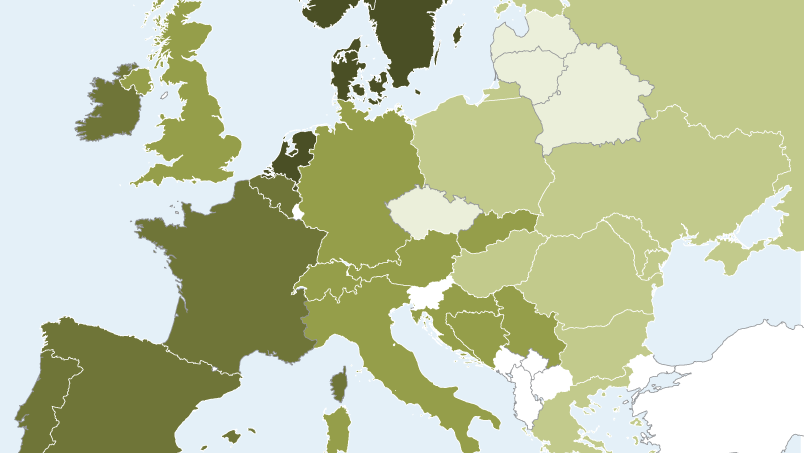
Our Experts
“A record 23 million Asian Americans trace their roots to more than 20 countries … and the U.S. Asian population is projected to reach 46 million by 2060.”

Methods 101 Videos
Methods 101: random sampling.
The first video in Pew Research Center’s Methods 101 series helps explain random sampling – a concept that lies at the heart of all probability-based survey research – and why it’s important.
Methods 101: Survey Question Wording
Methods 101: mode effects, methods 101: what are nonprobability surveys, add pew research center to your alexa.
Say “Alexa, enable the Pew Research Center flash briefing”
Signature Reports
Race and lgbtq issues in k-12 schools, representative democracy remains a popular ideal, but people around the world are critical of how it’s working, americans’ dismal views of the nation’s politics, measuring religion in china, diverse cultures and shared experiences shape asian american identities, parenting in america today, editor’s picks, religious ‘nones’ in america: who they are and what they believe, among young adults without children, men are more likely than women to say they want to be parents someday, fewer young men are in college, especially at 4-year schools, about 1 in 5 u.s. teens who’ve heard of chatgpt have used it for schoolwork, women and political leadership ahead of the 2024 election, #blacklivesmatter turns 10, immigration & migration, migrant encounters at the u.s.-mexico border hit a record high at the end of 2023, what we know about unauthorized immigrants living in the u.s., latinos’ views of and experiences with the spanish language, social media, how teens and parents approach screen time, 5 facts about how americans use facebook, two decades after its launch, a declining share of adults, and few teens, support a u.s. tiktok ban, 81% of u.s. adults – versus 46% of teens – favor parental consent for minors to use social media, how americans view data privacy.
About Pew Research Center Pew Research Center is a nonpartisan fact tank that informs the public about the issues, attitudes and trends shaping the world. It conducts public opinion polling, demographic research, media content analysis and other empirical social science research. Pew Research Center does not take policy positions. It is a subsidiary of The Pew Charitable Trusts .
Featured Topics
Featured series.
A series of random questions answered by Harvard experts.
Explore the Gazette
Read the latest.

Co-chairs of task forces share updates on community engagement

For all the other Willie Jacks

Herbert Chanoch Kelman, 94
Exploring generative ai at harvard.
Jessica McCann
Harvard Correspondent

Leaders weigh in on where we are and what’s next
The explosion of generative AI technology over the past year and a half is raising big questions about how these tools will impact higher education. Across Harvard, members of the community have been exploring how GenAI will change the ways we teach, learn, research, and work.
As part of this effort, the Office of the Provost has convened three working groups . They will discuss questions, share innovations, and evolve guidance and community resources. They are:
- The Teaching and Learning Group , chaired by Bharat Anand , vice provost for advances in learning and the Henry R. Byers Professor of Business Administration at Harvard Business School. This group seeks to share resources, identify emerging best practices, guide policies, and support the development of tools to address common challenges among faculty and students.
- The Research and Scholarship Group , chaired by John Shaw , vice provost for research, Harry C. Dudley Professor of Structural and Economic Geology in the Earth and Planetary Sciences Department, and professor of environmental science and engineering in the Paulson School of Engineering and Applied Science. It focuses on how to enable, and support the integrity of, scholarly activities with generative AI tools.
- T he Administration and Operations Group , chaired by Klara Jelinkova , vice president and University chief information officer. It is charged with addressing information security, data privacy, procurement, and administration and organizational efficiencies.

Klara Jelinkova, Bharat Anand, and John Shaw.
Photos by Kris Snibbe/Harvard Staff Photographer; Evgenia Eliseeva; and courtesy of John Shaw
The Gazette spoke with Anand, Shaw, and Jelinkova to understand more about the work of these groups and what’s next in generative AI at Harvard.
When generative AI tools first emerged, we saw universities respond in a variety of ways — from encouraging experimentation to prohibiting their use. What was Harvard’s overall approach?
Shaw: From the outset, Harvard has embraced the prospective benefits that GenAI offers to teaching, research, and administration across the University, while being mindful of the potential pitfalls. As a University, our mission is to help enable discovery and innovation, so we had a mandate to actively engage. We set some initial, broad policies that helped guide us, and have worked directly with groups across the institution to provide tools and resources to inspire exploration.
Jelinkova: The rapid emergence of these tools meant the University needed to react quickly, to provide both tools for innovation and experimentation and guidelines to ensure their responsible use. We rapidly built an AI Sandbox to enable faculty, students, and staff to experiment with multiple large language models in a secure environment. We also worked with external vendors to acquire enterprise licenses for a variety of tools to meet many different use cases. Through working groups, we were able to learn, aggregate and collate use cases for AI in teaching, learning, administration, and research. This coordinated, collective, and strategic approach has put Harvard ahead of many peers in higher education.
Anand: Teaching and learning are fundamentally decentralized activities. So our approach was to ask: First, how can we ensure that local experimentation by faculty and staff is enabled as much as possible; and second, how can we ensure that it’s consistent with University policies on IP, copyright, and security? We also wanted to ensure that novel emerging practices were shared across Schools, rather than remaining siloed.
What do these tools mean for faculty, in terms of the challenges they pose or the opportunities they offer? Is there anything you’re particularly excited about?
Anand: Let’s start with some salient challenges. How do we first sift through the hype that’s accompanied GenAI? How can we make it easy for faculty to use GenAI tools in their classrooms without overburdening them with yet another technology? How can one address real concerns about GenAI’s impact?
While we’re still early in this journey, many compelling opportunities — and more importantly, some systematic ways of thinking about them — are emerging. Various Harvard faculty have leaned into experimenting with LLMs in their classrooms. Our team has now interviewed over 30 colleagues across Harvard and curated short videos that capture their learnings. I encourage everyone to view these materials on the new GenAI site; they are remarkable in their depth and breadth of insight.
Here’s a sample: While LLMs are commonly used for Q&A, our faculty have creatively used them for a broader variety of tasks, such as simulating tutors that guide learning by asking questions, simulating instructional designers to provide active learning tips, and simulating student voices to predict how a class discussion might flow, thus aiding in lesson preparation. Others demonstrate how more sophisticated prompts or “prompt engineering” are often necessary to yield more sophisticated LLM responses, and how LLMs can extend well beyond text-based responses to visuals, simulations, coding, and games. And several faculty show how LLMs can help overcome subtle yet important learning frictions like skill gaps in coding, language literacy, or math.
Do these tools offer students an opportunity to support or expand upon their learning?
Anand: Yes. GenAI represents a unique area of innovation where students and faculty are working together. Many colleagues are incorporating student feedback into the GenAI portions of their curriculum or making their own GenAI tools available to students. Since GenAI is new, the pedagogical path is not yet well defined; students have an opportunity to make their voices heard, as co-creators, on what they think the future of their learning should look like.
Beyond this, we’re starting to see other learning benefits. Importantly, GenAI can reach beyond a lecture hall. Thoughtful prompt engineering can turn even publicly available GenAI tools into tutorbots that generate interactive practice problems, act as expert conversational aids for material review, or increase TA teams’ capacity. That means both that the classroom is expanding and that more of it is in students’ hands. There’s also evidence that these bots field more questions than teaching teams can normally address and can be more comfortable and accessible for some students.
Of course, we need to identify and counter harmful patterns. There is a risk, in this early and enthusiastic period, of sparking over-reliance on GenAI. Students must critically evaluate how and where they use it, given its possibility of inaccurate or inappropriate responses, and should heed the areas where their style of cognition outperforms AI. One other thing to watch out for is user divide: Some students will graduate with vastly better prompt engineering skills than others, an inequality that will only magnify in the workforce.
What are the main questions your group has been tackling?
Anand: Our group divided its work into three subgroups focused on policy, tools, and resources. We’ve helped guide initial policies to ensure safe and responsible use; begun curating resources for faculty in a One Harvard repository ; and are exploring which tools the University should invest in or develop to ensure that educators and researchers can continue to advance their work.
In the fall, we focused on supporting and guiding HUIT’s development of the AI Sandbox. The Harvard Initiative for Learning and Teaching’s annual conference , which focused exclusively on GenAI, had its highest participation in 10 years. Recently, we’ve been working with the research group to inform the development of tools that promise broad, generalizable use for faculty (e.g., tutorbots).
What has your group focused on in discussions so far about generative AI tools’ use in research?
Shaw: Our group has some incredible strength in researchers who are at the cutting edge of GenAI development and applications, but also includes voices that help us understand the real barriers to faculty and students starting to use these tools in their own research and scholarship. Working with the other teams, we have focused on supporting development and use of the GenAI sandbox, examining IP and security issues, and learning from different groups across campus how they are using these tools to innovate.
Are there key areas of focus for your group in the coming months?
Shaw: We are focused on establishing programs — such as the new GenAI Milton Fund track — to help support innovation in the application of these tools across the wide range of scholarship on our campus. We are also working with the College to develop new programs to help support students who wish to engage with faculty on GenAI-enabled projects. We aim to find ways to convene students and scholars to share their experiences and build a stronger community of practitioners across campus.
What types of administration and operations questions are your group is exploring, and what type of opportunities do you see in this space?
Jelinkova: By using the group to share learnings from across Schools and units, we can better provide technologies to meet the community’s needs while ensuring the most responsible and sustainable use of the University’s financial resources. The connections within this group also inform the guidelines that we provide; by learning how generative AI is being used in different contexts, we can develop best practices and stay alert to emerging risks. There are new tools becoming available almost every day, and many exciting experiments and pilots happening across Harvard, so it’s important to regularly review and update the guidance we provide to our community.
Can you talk a bit about what has come out of these discussions, or other exciting things to come?
Jelinkova: Because this technology is rapidly evolving, we are continually tracking the release of new tools and working with our vendors as well as open-source efforts to ensure we are best supporting the University’s needs. We’re developing more guidance and hosting information sessions on helping people to understand the AI landscape and how to choose the right tool for their task. Beyond tools, we’re also working to build connections across Harvard to support collaboration, including a recently launched AI community of practice . We are capturing valuable findings from emerging technology pilot programs in HUIT , the EVP area , and across Schools. And we are now thinking about how those findings can inform guiding principles and best practices to better support staff.
While the GenAI groups are investigating these questions, Harvard faculty and scholars are also on the forefront of research in this space. Can you talk a bit about some of the interesting research happening across the University in AI more broadly ?
Shaw: Harvard has made deep investments in the development and application of AI across our campus, in our Schools, initiatives, and institutes — such as the Kempner Institute and Harvard Data Science Initiative. In addition, there is a critical role for us to play in examining and guiding the ethics of AI applications — and our strengths in the Safra and Berkman Klein centers, as examples, can be leading voices in this area.
What would be your advice for members of our community who are interested in learning more about generative AI tools?
Anand: I’d encourage our community to view the resources available on the new Generative AI @ Harvard website , to better understand how GenAI tools might benefit you.
There’s also no substitute for experimentation with these tools to learn what works, what does not, and how to tailor them for maximal benefit for your particular needs. And of course, please know and respect University policies around copyright and security.
We’re in the early stages of this journey at Harvard, but it’s exciting.
Share this article
You might like.
Leaders of efforts to combat antisemitism and anti-Muslim and anti-Arab bias describe what they’ve heard so far from members of the Harvard community

‘Reservation Dogs’ star Paulina Alexis offers behind-the-scenes glimpse of hit show, details value of Native representation

Memorial Minute — Faculty of Arts and Sciences
Yes, it’s exciting. Just don’t look at the sun.
Lab, telescope specialist details Harvard eclipse-viewing party, offers safety tips
Forget ‘doomers.’ Warming can be stopped, top climate scientist says
Michael Mann points to prehistoric catastrophes, modern environmental victories
How dating sites automate racism
Sociologist’s new book finds algorithms that suggest partners often reflect stereotypes, biases
'ZDNET Recommends': What exactly does it mean?
ZDNET's recommendations are based on many hours of testing, research, and comparison shopping. We gather data from the best available sources, including vendor and retailer listings as well as other relevant and independent reviews sites. And we pore over customer reviews to find out what matters to real people who already own and use the products and services we’re assessing.
When you click through from our site to a retailer and buy a product or service, we may earn affiliate commissions. This helps support our work, but does not affect what we cover or how, and it does not affect the price you pay. Neither ZDNET nor the author are compensated for these independent reviews. Indeed, we follow strict guidelines that ensure our editorial content is never influenced by advertisers.
ZDNET's editorial team writes on behalf of you, our reader. Our goal is to deliver the most accurate information and the most knowledgeable advice possible in order to help you make smarter buying decisions on tech gear and a wide array of products and services. Our editors thoroughly review and fact-check every article to ensure that our content meets the highest standards. If we have made an error or published misleading information, we will correct or clarify the article. If you see inaccuracies in our content, please report the mistake via this form .
The best AI image generators to try right now

If you've ever searched Google high and low to find an image you needed to no avail, artificial intelligence (AI) may be able to help.
With AI image generators, you can type in a prompt as detailed or vague as you'd like to fit an array of purposes and have the image you were thinking of instantly pop up on your screen. These tools can help with branding, social media content creation, and making invitations, flyers, business cards, and more.
Also: ChatGPT no longer requires a login, but you might want one anyway. Here's why
Even if you have no professional use for AI, don't worry -- the process is so fun that anyone can (and should) try it out.
OpenAI's DALL-E 2 made a huge splash because of its advanced capabilities as the first mainstream AI image generator. However, since its initial launch, there have been many developments. Other companies have released models that rival DALL-E 2, and OpenAI even released a more advanced model known as DALL-E 3 , discontinuing its predecessor.
To help you discover which models are the best for different tasks, I put the image generators to the test by giving each tool the same prompt: "Two Yorkies sitting on a beach that is covered in snow". I also included screenshots to help you decide which is best.
Also: DALL-E adds new ways to edit and create AI-generated images. Learn how to use it
While I found the best overall AI image generator is Image Creator from Microsoft Designer , due to its free-of-charge, high-quality results, other AI image generators perform better for specific needs. For the full roundup of the best AI image generators, keep reading.
The best AI image generators of 2024
Image creator from microsoft designer (formerly bing image creator), best ai image generator overall.
- Powered by DALL-E 3
- Convenient to access
- Need a Microsoft account
- In preview stage
Image Creator from Microsoft Designer is powered by DALL-E 3, OpenAI's most advanced image-generating model. As a result, it produces the same quality results as DALL-E while remaining free to use as opposed to the $20 per month fee to use DALL-E.
All you need to do to access the image generator is visit the Image Creator website and sign in with a Microsoft account.
Another major perk about this AI generator is that you can also access it in the same place where you can access Microsoft's AI chatbot, Copilot (formerly Bing Chat) .
This capability means that in addition to visiting Image Creator on its standalone site, you can ask it to generate images for you in Copilot. To render an image, all you have to do is conversationally ask Copilot to draw you any image you'd like.
Also: How to use Image Creator from Microsoft Designer (formerly Bing Image Creator)
This feature is so convenient because you can satisfy all your image-generating and AI-chatting needs in the same place for free. This combination facilitates tasks that could benefit from image and text generation, such as party planning, as you can ask the chatbot to generate themes for your party and then ask it to create images that follow the theme.
Image Creator from Microsoft Designer f eatures: Powered by: DALL-E 3 | Access via: Copilot, browser, mobile | Output: 4 images per prompt | P rice: Free
DALL-E 3 by OpenAI
Best ai image generator if you want to experience the inspiration.
- Not copyrighted
- Accurate depictions
- Confusing credits
OpenAI, the AI research company behind ChatGPT, launched DALL-E 2 in November 2022. The tool quickly became the most popular AI image generator on the market. However, after launching its most advanced image generator, DALL-E 3, OpenAI discontinued DALL-E 2.
DALL-E 3 is even more capable than the original model, but this ability comes at a cost. To access DALL-E 3 you must be a ChatGPT Plus subscriber, and the membership costs $20 per month per user. You can access DALL-E 3 via ChatGPT or the ChatGPT app.
Using DALL-E 3 is very intuitive. Type in whatever prompt you'd like, specifying as much detail as necessary to bring your vision to life, and then DALL-E 3 will generate four images from your prompt. As you can see in the image at the top of the article, the renditions are high quality and very realistic.
OpenAI even recently added new ways to edit an image generated by the chatbot, including easy conversational text prompts and the ability to click on parts of the image you want to edit.
Like with Copilot, you can chat and render your images on the same platform, making it convenient to work on projects that depend on image and text generation. If you don't want to shell out the money, Image Creator by Designer is a great alternative since it's free, uses DALL-E 3, and can be accessed via Copilot.
DALL-E 3 features: Powered by: DALL-E 3 by OpenAI | Access via: ChatGPT website and app | Output: 4 images per credit | Price: ChatGPT Plus subscription, $20 per month
ImageFX by Google
The best ai image generator for beginners.
- Easy-to-use
- High-quality results
- Expressive chips
- Need a Google account
- Strict guardrails can be limiting
Google's ImageFX was a dark horse, entering the AI image generator space much later than its competition, over a year after DALL-E 2 launched. However, the generator's performance seems to have been worth the wait. The image generator can produce high-quality, realistic outputs, even objects that are difficult to render, such as hands.
Also: I just tried Google's ImageFX AI image generator, and I'm shocked at how good it is
The tool boasts a unique feature, expressive chips, that make it easier to refine your prompts or generate new ones via dropdowns, which highlight parts of your prompt and suggest different word changes to modify your output.
ImageFX also includes suggestions for the style you'd like your image rendered in, such as photorealistic, 35mm film, minimal, sketch, handmade, and more. This combination of features makes ImageFX the perfect for beginners who want to experiment.
ImageFX from Google: Powered by: Imagen 2 | Access via: Website | Output: 4 images | Price: free
DreamStudio by Stability AI
Best ai image generator for customization.
- Accepts specific instruction
- Open source
- More entries for customization
- Paid credits
- Need to create an account
Stability AI created the massively popular, open-sourced, text-to-image generator, Stable Diffusion. Users can download the tool and use it at no cost. However, using this tool typically requires technical skill.
Also : How to use Stable Diffusion AI to create amazing images
To make the technology readily accessible to everyone (regardless of skill level), Stability AI created DreamStudio, which incorporates Stable Diffusion in a UI that is easy to understand and use.
One of the standouts of the platform is that it includes many different entries for customization, including a "negative prompt" where you can delineate the specifics of what you'd like to avoid in the final image. You can also easily change the image ratio -- that's a key feature, as most AI image generators automatically deliver 1:1.
DreamStudio features: Powered by: SDXL 1.0 by Stability AI | Access via: Website | Output: 1 image per 2 credits | Price: $1 per 100 credits | Credits: 25 free credits when you open an account; buy purchase once you run out
Dream by WOMBO
Best ai image generator for your phone.
- Remix your own images
- Multiple templates
- One image per prompt
- Subscription cost for full access
This app took the first-place spot for the best overall app in Google Play's 2022 awards , and it has five stars on Apple's App Store with 141.6K ratings. With the app, you can create art and images with the simple input of a quick prompt.
An added plus is this AI image generator allows you to pick different design styles such as realistic, expressionist, comic, abstract, fanatical, ink, and more.
Also : How to use Dream by WOMBO to generate artwork in any style
In addition to the app, the tool has a free desktop mobile version that is simple to use. If you want to take your use of the app to the next level, you can pay $90 per year or $10 per month.
Dream by WOMBO f eatures: Powered by: WOMBO AI's machine-learning algorithm | Access via: Mobile and desktop versions | Output: 1 image with a free version, 4 with a paid plan | Price: Free limited access
Best no-frills AI image generator
- Unlimited access
- Simple to use
- Longer wait
- Inconsistent images
Despite originally being named DALL-E mini, this AI image generator is NOT affiliated with OpenAI or DALL-E 2. Rather, it is an open-source alternative. However, the name DALL-E 2 mini is somewhat fitting as the tool does everything DALL-E 2 does, just with less precise renditions.
Also : How to use Craiyon AI (formerly known as DALL-E mini)
Unlike DALL-E 2, the outputs from Craiyon lack quality and take longer to render (approximately a minute). However, because you have unlimited prompts, you can continue to tweak the prompt until you get your exact vision. The site is also simple to use, making it perfect for someone wanting to experiment with AI image generators. It also generates six images, more than any other chatbot listed.
Craiyon f eatures: Powered by: Their model | Access via : Craiyon website | Output: 6 images per prompt | Price: Free, unlimited prompts
Best AI image generator for highest quality photos
- Very high-quality outputs
- Discord community
- Monthly cost
- Confusing to set up
I often play around with AI image generators because they make it fun and easy to create digital artwork. Despite all my experiences with different AI generators, nothing could have prepared me for Midjourney -- in the best way.
The output of the image was so crystal clear that I had a hard time believing it wasn't an actual picture that someone took of my prompt. This software is so good that it has produced award-winning art .
However, I think Midjourney isn't user-friendly and it confuses me. If you also need extra direction, check out our step-by-step how-to here: How to use Midjourney to generate amazing images and art .
Another problem with the tool is that you may not access it for free. When I tried to render images, I got this error message: "Due to extreme demand, we can't provide a free trial right now. Please subscribe to create images with Midjourney."
To show you the quality of renditions, I've included a close-up below from a previous time I tested the generator. The prompt was: "A baby Yorkie sitting on a comfy couch in front of the NYC skyline."
Midjourney f eatures: Powered by: Midjourney; utilizes Discord | Access via: Discord | Output: 4 images per prompt | Price: Starts at $10/month
Adobe Firefly
Best ai image generator if you have a reference photo.
- Structure and Style Reference
- Commercial-safe
- Longer lag than other generators
- More specific prompts required
Adobe has been a leader in developing creative tools for creative and working professionals for decades. As a result, it's no surprise that its image generator is impressive. Accessing the generator is easy. Just visit the website and type the prompt of the image you'd like generated.
Also: This new AI tool from Adobe makes generating the images you need even simpler
As you can see above, the images rendered of the Yorkies are high-quality, realistic, and detailed. Additionally, the biggest standout features of this chatbot are its Structure Reference and Style Reference features.
Structure Reference lets users input an image they want the AI model to use as a template. The model then uses this structure to create a new image with the same layout and composition. Style Reference uses an image as a reference to generate a new image in the same style.
These features are useful if you have an image you'd like the new, generated image to resemble, for example, a quick sketch you drew or even a business logo or style you'd like to keep consistent.
Another perk is that Adobe Firefly was trained on Adobe Stock images, openly licensed content, and public domain content, making all the images generated safe for commercial use and addressing the ethics issue of image generators.
Adobe Firefly f eatures: Powered by: Firefly Image 2 | Access via: Website | Output: 4 images per prompt | P rice: Free
Generative AI by Getty Images
Best ai image generator for businesses.
- Commercially safe
- Contributor compensation program
- Personalized stock photos
- Not clear about pricing
- Not individual-friendly
One of the biggest issues with AI image generators is that they typically train their generators on content from the entirety of the internet, which means the generators use aspects of creators' art without compensation. This approach also puts businesses that use generators at risk of copyright infringement.
Generative AI by Getty Images tackles that issue by generating images with content solely from Getty Images' vast creative library with full indemnification for commercial use. The generated images will have Getty Images' standard royalty-free license, assuring customers that their content is fair to use without fearing legal repercussions.
Another pro is that contributors whose content was used to train the models will be compensated for their inclusion in the training set. This is a great solution for businesses that want stock photos that match their creative vision but do not want to deal with copyright-related issues.
ZDNET's Tiernan Ray went hands-on with the AI image generator. Although the tool did not generate the most vivid images, especially compared to DALL-E, it did create accurate, reliable, and useable stock images.
Generative AI by Getty Images f eatures: Powered by: NVIDIA Picasso | Access via: Website | Output: 4 images per prompt | P rice: Paid (price undisclosed, have to contact the team)
What is the best AI image generator?
Image Creator from Microsoft Designer is the best overall AI image generator. Like DALL-E 3, Image Creator from Microsoft Designer combines accuracy, speed, and cost-effectiveness, and can generate high-quality images in seconds. However, unlike DALL-E 3, this Microsoft version is entirely free.
Whether you want to generate images of animals, objects, or even abstract concepts, Image Creator from Microsoft Designer can produce accurate depictions that meet your expectations. It is highly efficient, user-friendly, and cost-effective.
Note: Prices and features are subject to change.
Which is the right AI image generator for you?
Although I crowned Image Creator from Microsoft Designer the best AI image generator overall, other AI image generators perform better for specific needs. For example, suppose you are a professional using AI image generation for your business. In that case, you may need a tool like Generative AI by Getty Images which renders images safe for commercial use.
On the other hand, if you want to play with AI art generating for entertainment purposes, Craiyon might be the best option because it's free, unlimited, and easy to use.
How did I choose these AI image generators?
To find the best AI image generators, I tested each generator listed and compared their performance. The factors that went into testing performance included UI/UX, image results, cost, speed, and availability. Each AI image generator had different strengths and weaknesses, making each one the ideal fit for individuals as listed next to my picks.
What is an AI image generator?
An AI image generator is software that uses AI to create images from user text inputs, usually within seconds. The images vary in style depending on the capabilities of the software, but can typically render an image in any style you want, including 3D, 2D, cinematic, modern, Renaissance, and more.
How do AI image generators work?
Like any other AI model, AI image generators work on learned data they are trained with. Typically, these models are trained on billions of images, which they analyze for characteristics. These insights are then used by the models to create new images.
Are there ethical implications with AI image generators?
AI image generators are trained on billions of images found throughout the internet. These images are often artworks that belong to specific artists, which are then reimagined and repurposed by AI to generate your image. Although the output is not the same image, the new image has elements of the artist's original work not credited to them.
Are there DALL-E 3 alternatives worth considering?
Contrary to what you might think, there are many AI image generators other than DALL-E 3. Some tools produce even better results than OpenAI's software. If you want to try something different, check out one of our alternatives above or the three additional options below.
Nightcafe is a multi-purpose AI image generator. The tool is worth trying because it allows users to create unique and original artwork using different inputs and styles, including abstract, impressionism, expressionism, and more.
Canva is a versatile and powerful AI image generator that offers a wide range of options within its design platform. It allows users to create professional-looking designs for different marketing channels, including social media posts, ads, flyers, brochures, and more.
Artificial Intelligence
This new ai tool from adobe makes generating the images you need even simpler, dall-e adds new ways to edit and create ai-generated images. learn how to use it, openai makes gpt-4 turbo with vision available to developers to unlock new ai apps.
The total solar eclipse 2024 is happening today! Here's what you need to know
Millions are ready to watch — are you?
It's the day we've all been waiting for! Total solar eclipse 2024 is finally here. Today (April 8) a total solar eclipse will sweep across North America from Mexico, through 15 U.S. States and up through Canada. For viewers inside the path of totality, the moon will completely cover the sun, darkening the sky and revealing our star's hidden outer atmosphere.
You can keep up to date with the latest eclipse content on our eclipse live blog and watch all the total eclipse action unfold live here on Space.com courtesy of NASA. Our livestream coverage begins at 1 p.m. EDT (1700 GMT).
If you capture a great photo of the solar eclipse and would like to share it with us please email it to [email protected] .
Related: 10 things you probably didn't know about the total solar eclipse 2024
Every U.S. State will experience at least a partial solar eclipse today. If you want to check what time you'll be able to see the solar eclipse and find out what it may look like from your location check out this great interactive map from NASA .
A total solar eclipse occurs when the moon passes directly between the sun and Earth, casting a shadow on our planet. It appears almost exactly the same size as our sun and for those witnessing the event from the path of totality, it will completely cover the sun's visible disk.
Last minute preparations
If you haven't been able to get hold of a pair of eclipse glasses and are looking for an easy way to still view the solar eclipse safely we have a list of some alternative ways to view the eclipse with items from around the home .
Get the Space.com Newsletter
Breaking space news, the latest updates on rocket launches, skywatching events and more!
Remember NEVER look directly at the sun. To safely view all of this event, you must use solar glasses or filters. Only those in the path of totality will be able to remove them briefly to see the sun's corona with their naked eyes. Those not in the path of totality must keep them on the entire time.
Everyone observing the partial phases of this eclipse — and for those outside the path of totality, that's the entire event — will need to wear solar eclipse glasses while cameras, telescopes and binoculars will need solar filters placed in front of their lenses.
Our how to observe the sun safely guide tells you everything you need to know about safe solar observations.
Eclipse timings
Submit your photos! If you capture a photo of the April 8 total solar eclipse or any of these strange effects and would like to share it with Space.com's readers, send photos, videos, comments, and your name, location and content usage permission release to [email protected].
Join our Space Forums to keep talking space on the latest missions, night sky and more! And if you have a news tip, correction or comment, let us know at: [email protected].

Daisy Dobrijevic joined Space.com in February 2022 having previously worked for our sister publication All About Space magazine as a staff writer. Before joining us, Daisy completed an editorial internship with the BBC Sky at Night Magazine and worked at the National Space Centre in Leicester, U.K., where she enjoyed communicating space science to the public. In 2021, Daisy completed a PhD in plant physiology and also holds a Master's in Environmental Science, she is currently based in Nottingham, U.K. Daisy is passionate about all things space, with a penchant for solar activity and space weather. She has a strong interest in astrotourism and loves nothing more than a good northern lights chase!
Eclipse 2026: The next total solar eclipse will be Europe's 1st in 27 years
Satellite views of solar eclipse 2024: See the moon's shadow race across North America (video, photos)
Totality was a total bust for me — but not for the reason you may think
- COLGeek Skies good, so far. Telescope setup and looked at sun spots a bit already. I'm kicking myself for not getting a CCD. Hoping for a good viewing today. Reply
- View All 1 Comment
Most Popular
By Samantha Mathewson April 09, 2024
By Stefanie Waldek April 09, 2024
By Daisy Dobrijevic April 08, 2024
By Alexander Cox April 08, 2024
By Monisha Ravisetti April 08, 2024
By Tariq Malik April 08, 2024
By Kimberly H. Breuer April 07, 2024
By Pedro Braganca April 07, 2024
By Mike Wall April 07, 2024
- 2 Eclipse 2026: The next total solar eclipse will be Europe's 1st in 27 years
- 3 SpaceX launches 23 Starlink satellites in nighttime liftoff (photos)
- 4 Satellite views of solar eclipse 2024: See the moon's shadow race across North America (video, photos)
- 5 Total solar eclipse 2024: Live updates

IMAGES
VIDEO
COMMENTS
But, top researchers keep an open mind and are always looking for inspiration in unexpected places. This article aims to give you an edge over researchers that rely mainly on Google for their entire research process. Our list of 28 academic search engines will start with the more familiar to less. #1. Google Scholar.
2. JSTOR. For journal articles, books, images, and even primary sources, JSTOR ranks among the best online resources for academic research. JSTOR's collection spans 75 disciplines, with strengths in the humanities and social sciences. The academic research database includes complete runs of over 2,800 journals.
Google Scholar provides a simple way to broadly search for scholarly literature. Search across a wide variety of disciplines and sources: articles, theses, books, abstracts and court opinions.
Get 30 days free. 1. Google Scholar. Google Scholar is the clear number one when it comes to academic search engines. It's the power of Google searches applied to research papers and patents. It not only lets you find research papers for all academic disciplines for free but also often provides links to full-text PDF files.
Harness the power of visual materials—explore more than 3 million images now on JSTOR. Enhance your scholarly research with underground newspapers, magazines, and journals. Explore collections in the arts, sciences, and literature from the world's leading museums, archives, and scholars. JSTOR is a digital library of academic journals ...
The Top 21 Free Online Journal and Research Databases. Navigating OA journals, research article databases, and academic websites trying to find high-quality sources for your research can really make your head spin.
Access 160+ million publications and connect with 25+ million researchers. Join for free and gain visibility by uploading your research.
3.3 million articles on ScienceDirect are open access. Articles published open access are peer-reviewed and made freely available for everyone to read, download and reuse in line with the user license displayed on the article. ScienceDirect is the world's leading source for scientific, technical, and medical research.
With 160+ million publication pages, 25+ million researchers and 1+ million questions, this is where everyone can access science. You can use AND, OR, NOT, "" and () to specify your search ...
Organize your papers in one place. Try Paperpile. 1. Scopus. Scopus is one of the two big commercial, bibliographic databases that cover scholarly literature from almost any discipline. Besides searching for research articles, Scopus also provides academic journal rankings, author profiles, and an h-index calculator. 2.
Research databases. You can search for scholarly sources online using databases and search engines like Google Scholar. These provide a range of search functions that can help you to find the most relevant sources. If you are searching for a specific article or book, include the title or the author's name. Alternatively, if you're just ...
To obtain the best experience, we recommend you use a more up to date browser (or turn off compatibility mode in Internet Explorer). ... research articles. Research articles. Filter By: Article ...
To obtain the best experience, we recommend you use a more up to date browser (or turn off compatibility mode in Internet Explorer). ... Research articles. Filter By: Article Type. All. All ...
ReferenceDesk.org: Dubbed "The Internet's Best Reference Source," this extremely useful web directory provides everything from business and finance information to federal government resources, scholarship details, links to newspapers and calendars, search engines, and more. Ask the Space Expert: NASA's source for space and science research help.
Subscription and open access journals from Sage, the world's leading independent academic publisher.
Work faster and smarter with advanced research discovery tools. Search the full text and citations of our millions of papers. Download groups of related papers to jumpstart your research. Save time with detailed summaries and search alerts. Advanced Search. PDF Packages of 37 papers.
Cake and cookies may increase Alzheimer's risk: Here are five Frontiers articles you won't want to miss. At Frontiers, we bring some of the world's best research to a global audience. But with tens of thousands of articles published each year, it's impossible to cover all of them. Here are just five amazing papers you may have missed.
The New England Journal of Medicine (NEJM) is a weekly general medical journal that publishes new medical research and review articles, and editorial opinion on a wide variety of topics of ...
RefSeek - Academic Search Engine. Web. Documents. Type 2 or more characters for results. Learn about: Charles Dickens, European Union. Browse the Reference Site Directory. Academic search engine for students and researchers. Locates relevant academic search results from web pages, books, encyclopedias, and journals.
Elsevier Journal Finder helps you find journals that could be best suited for publishing your scientific article. Journal Finder uses smart search technology and field-of-research specific vocabularies to match your paper's abstract to scientific journals.
more top society/education stories. Breaking science news and articles on global warming, extrasolar planets, stem cells, bird flu, autism, nanotechnology, dinosaurs, evolution -- the latest ...
Science News features daily news articles, feature stories, reviews and more in all disciplines of science, as well as Science News magazine archives back to 1924. ... How patient-led research ...
ScienceOpen is a research, networking, and discovery platform. We specialize in: Smart search and discovery within an interactive interface. Researcher promotion and ORCID integration. Open evaluation with article reviews and Collections. Business model based on providing services to publishers. Show video.
Read what research articles say about each other. scite is an award-winning platform for discovering and evaluating scientific articles via Smart Citations. Smart Citations allow users to see how a publication has been cited by providing the context of the citation and a classification describing whether it provides supporting or contrasting ...
About Pew Research Center Pew Research Center is a nonpartisan fact tank that informs the public about the issues, attitudes and trends shaping the world. It conducts public opinion polling, demographic research, media content analysis and other empirical social science research. Pew Research Center does not take policy positions.
Shaw: From the outset, Harvard has embraced the prospective benefits that GenAI offers to teaching, research, and administration across the University, while being mindful of the potential pitfalls. As a University, our mission is to help enable discovery and innovation, so we had a mandate to actively engage.
DALL-E 3. An upgraded version of the original best AI image generator that combines accuracy, speed, and cost-effectiveness. It allows users to generate high-quality images quickly and easily ...
LOGAN - WebAIM (web accessibility in mind) is part of Utah State University's Institute for Disability Research, Policy & Practice. WebAIM was created to expand the potential of the web for people with disabilities. And for the sixth year the WebAIM Million report, released this month, details accessibility to the world's top 1 million ...
Add articles to your saved list and come back to them any time. Movement at any time of day is essential for good health. But if you want a specific outcome, exercising at a particular time of day ...
Total solar eclipse 2024 is finally here. Today (April 8) a total solar eclipse will sweep across North America from Mexico, through 15 U.S. States and up through Canada. For viewers inside the ...